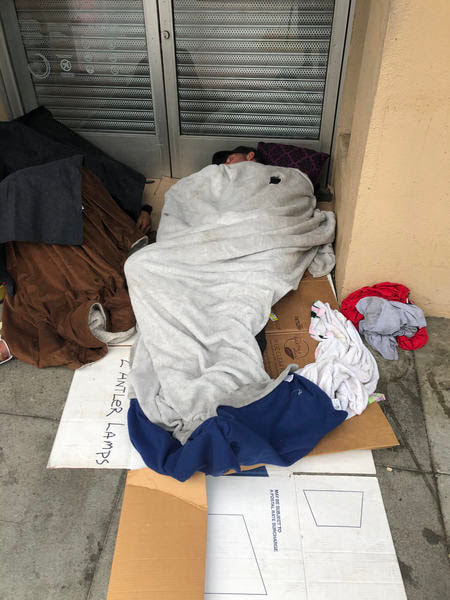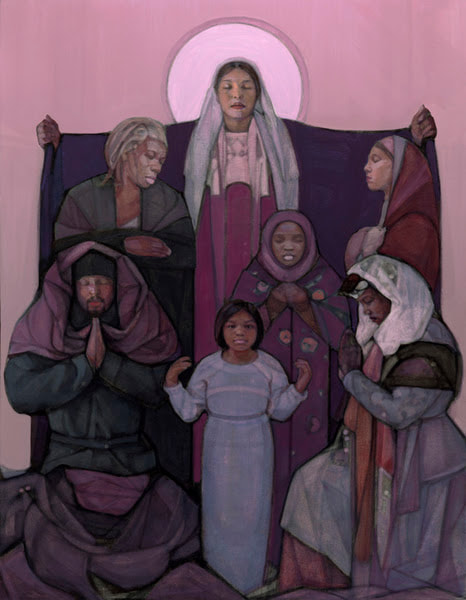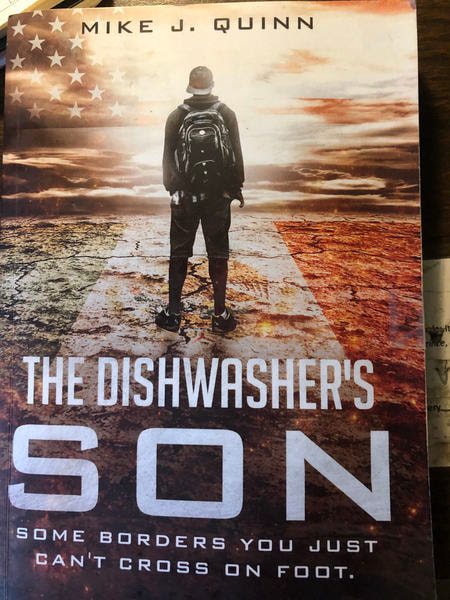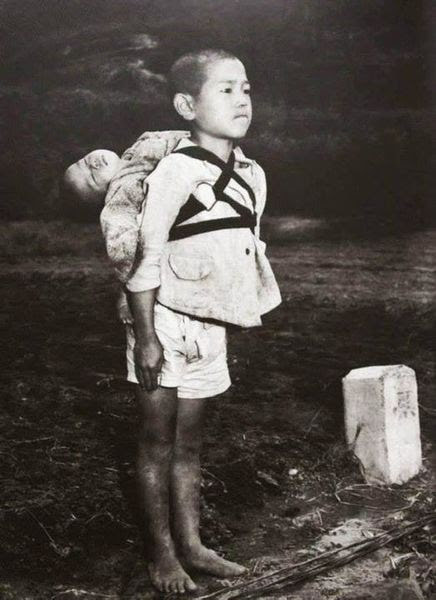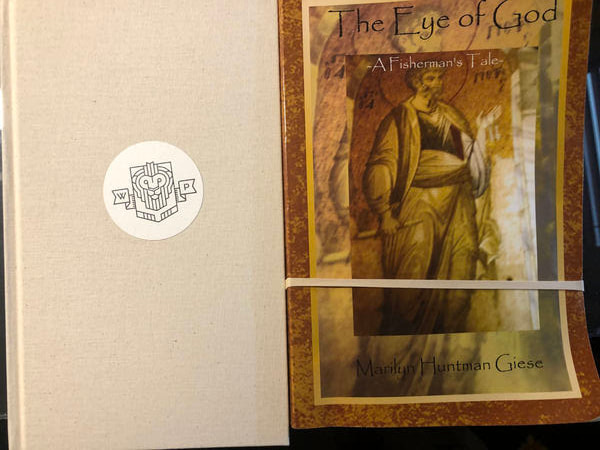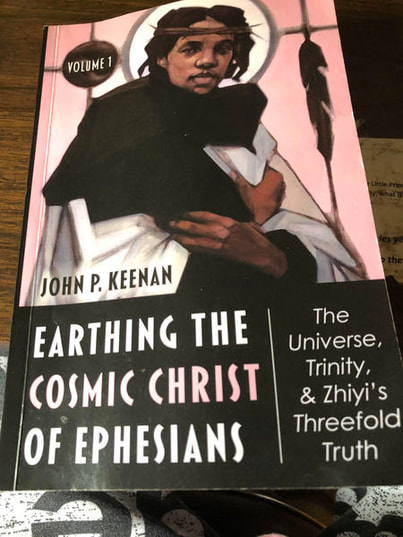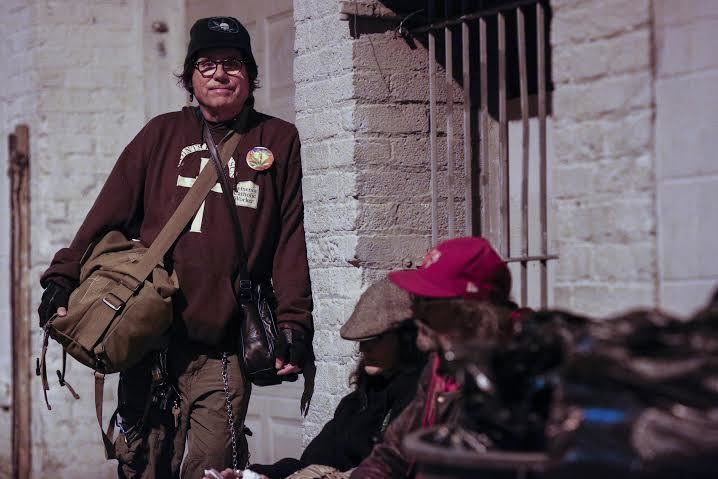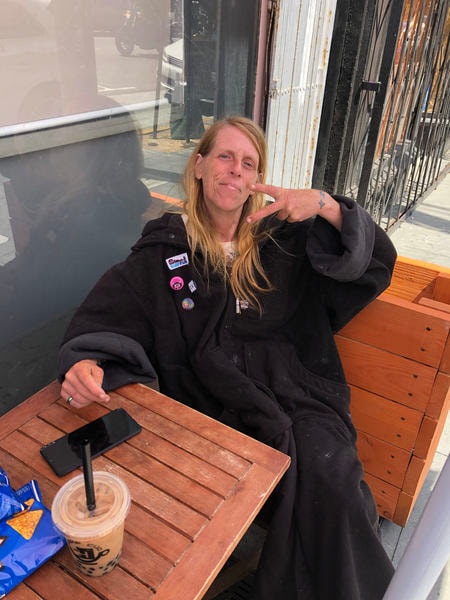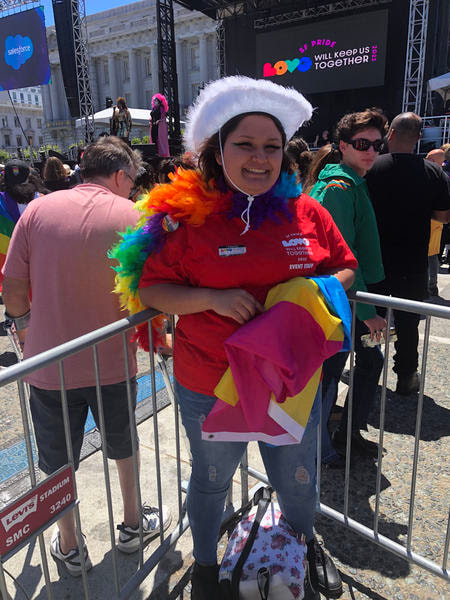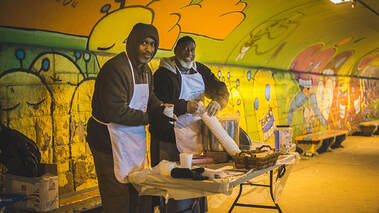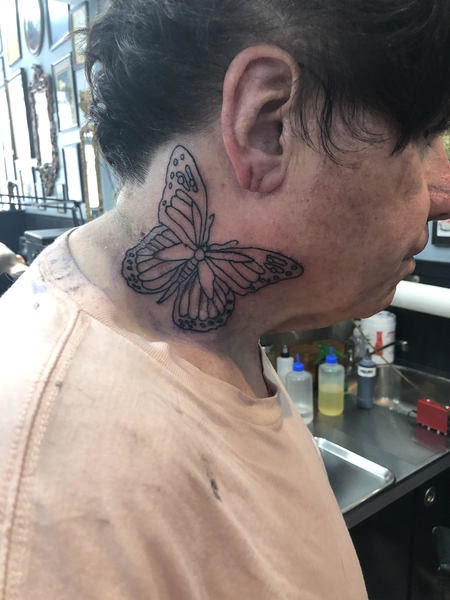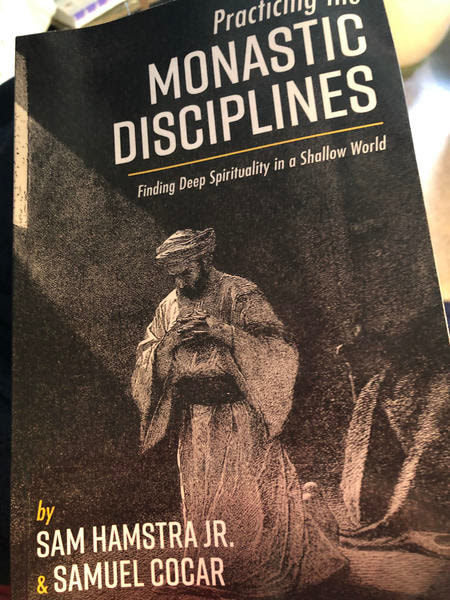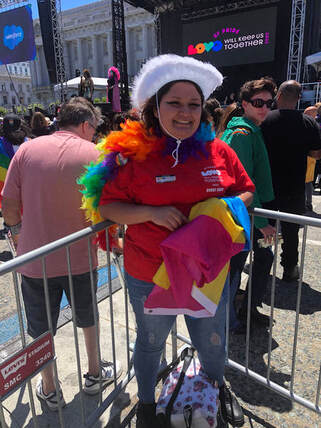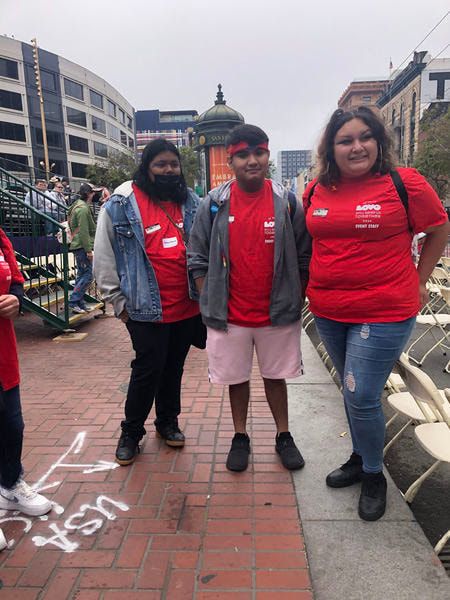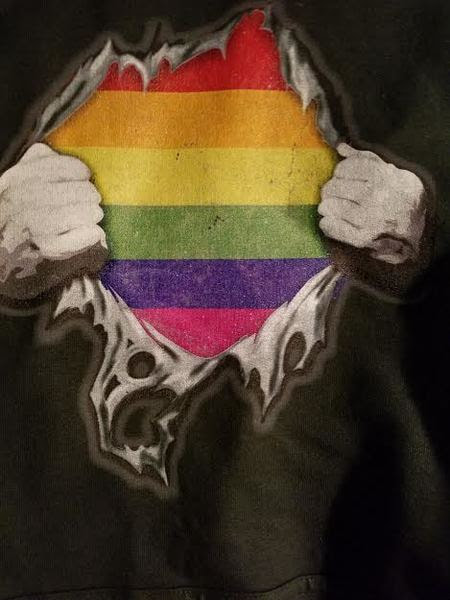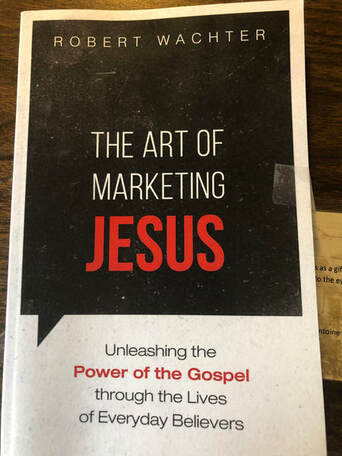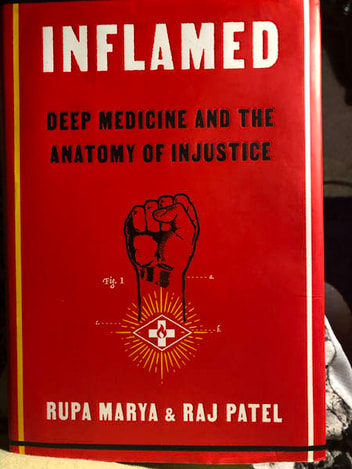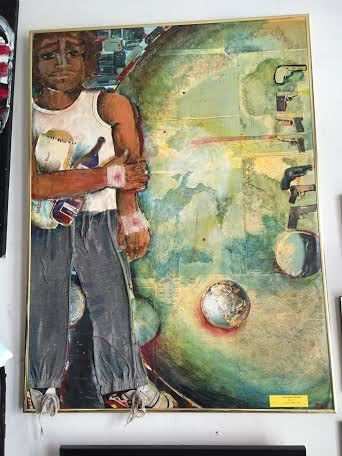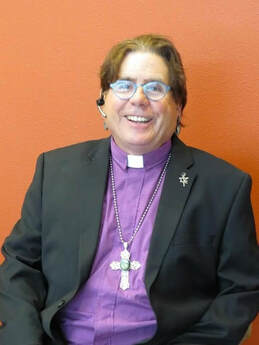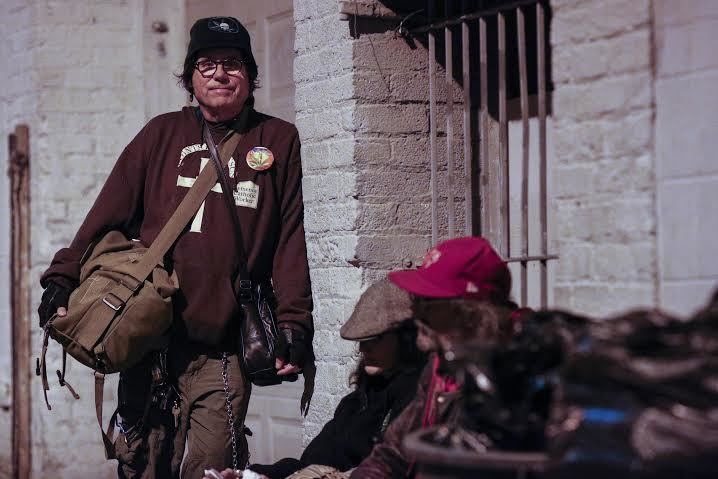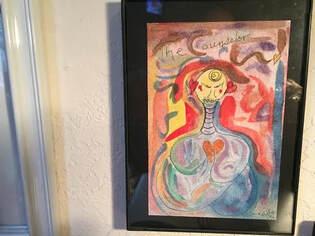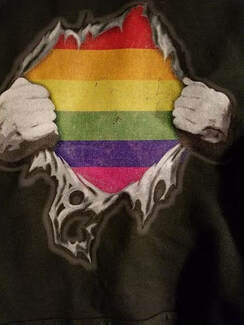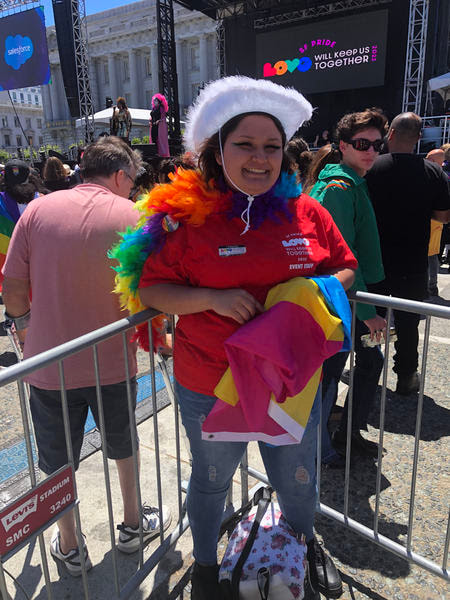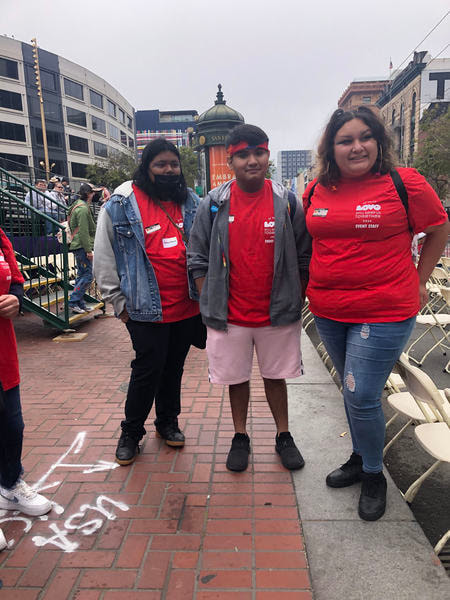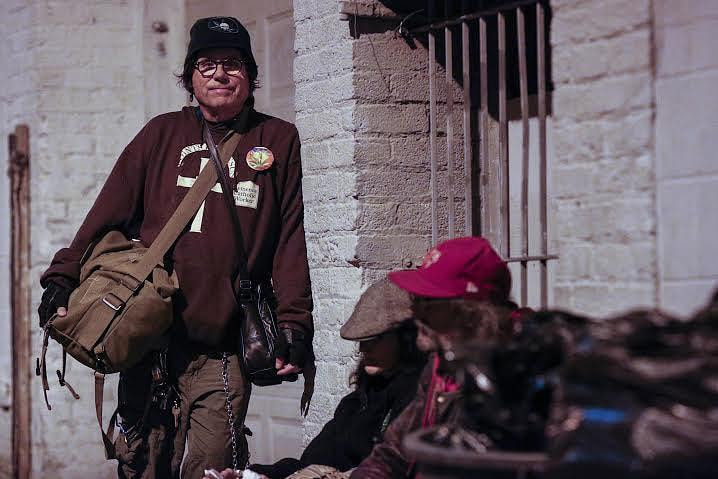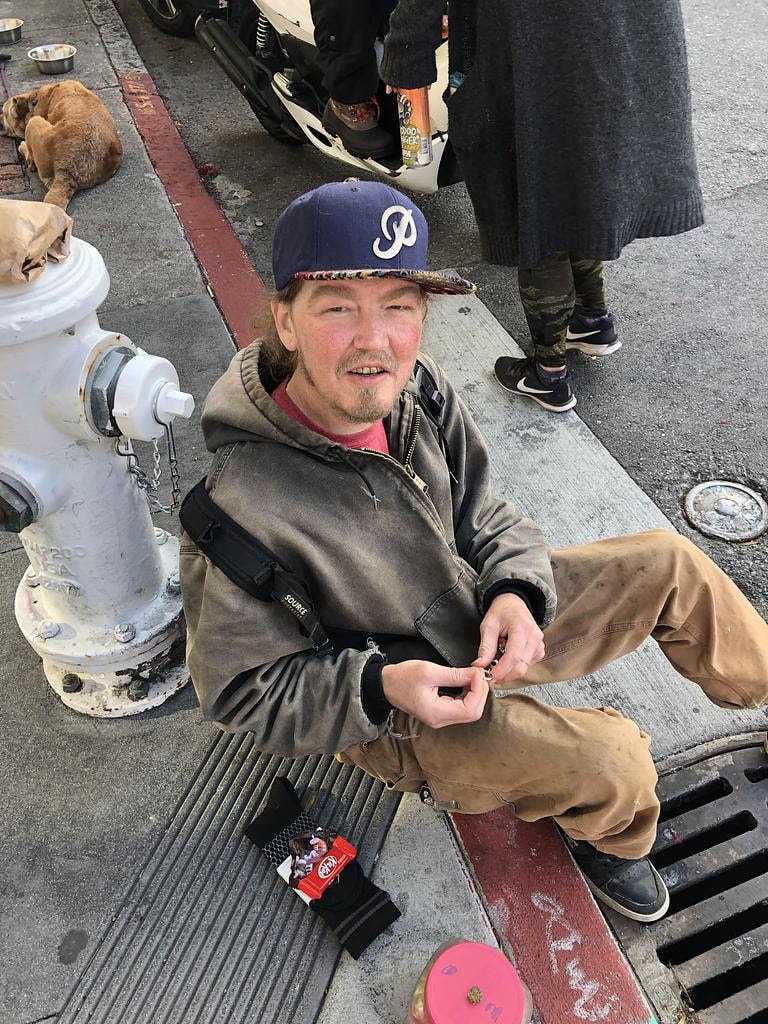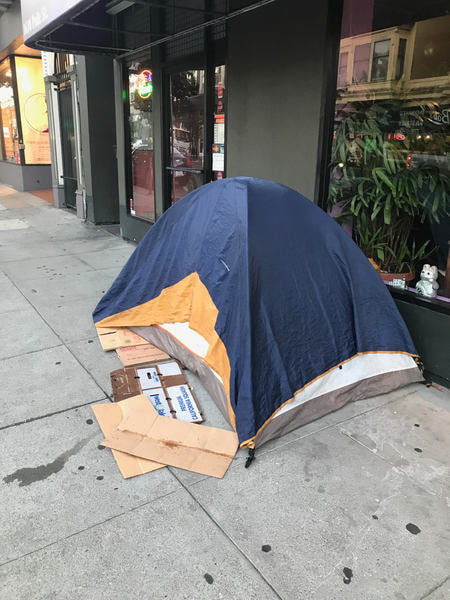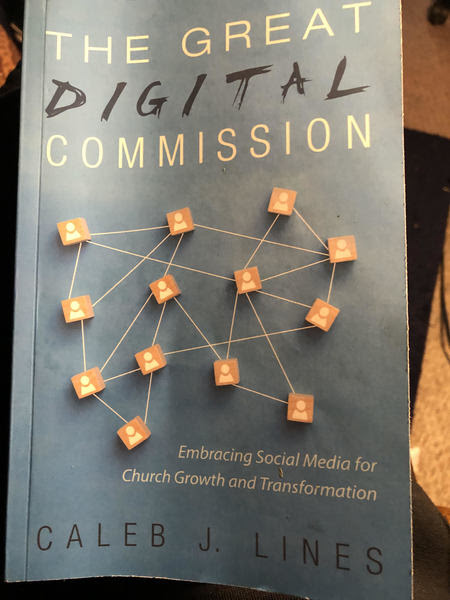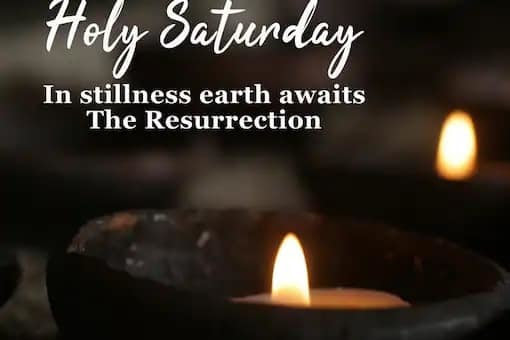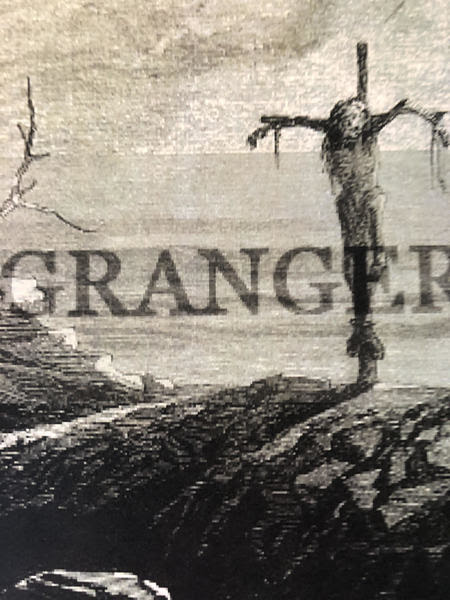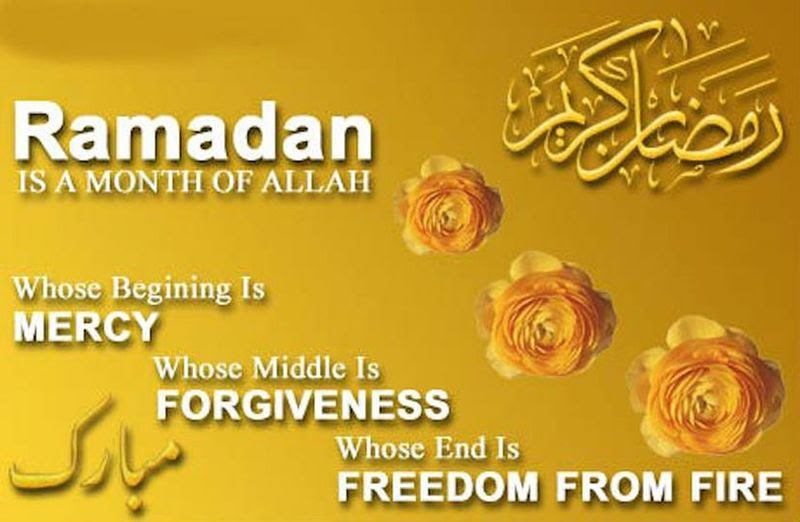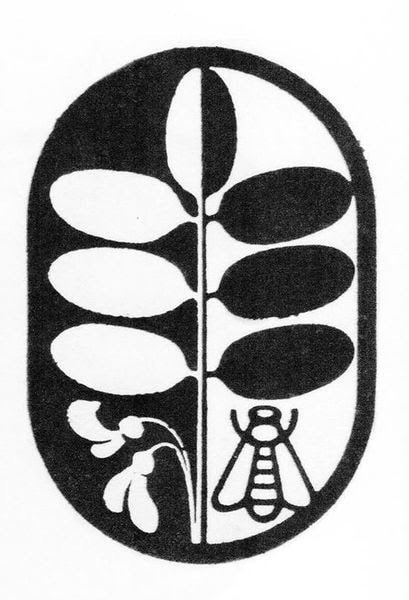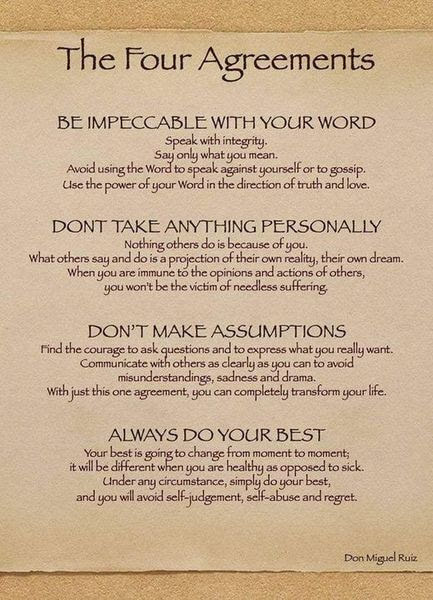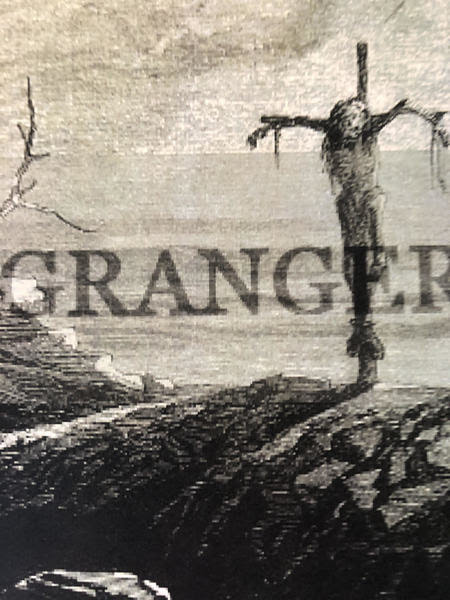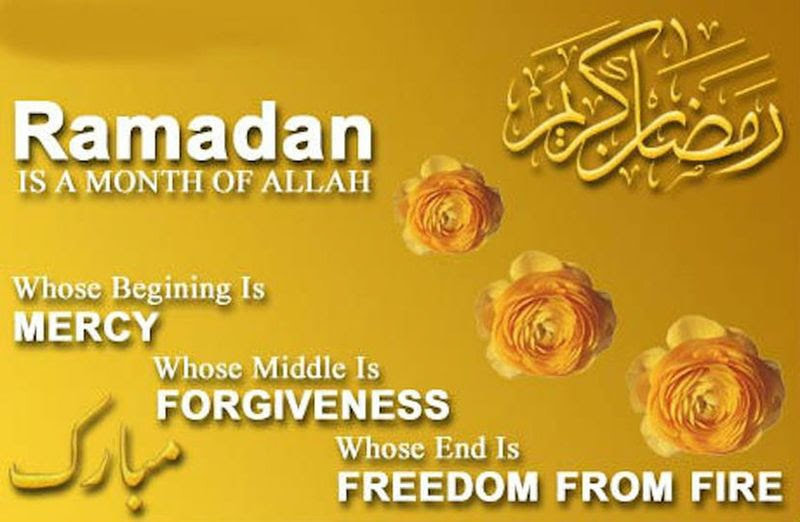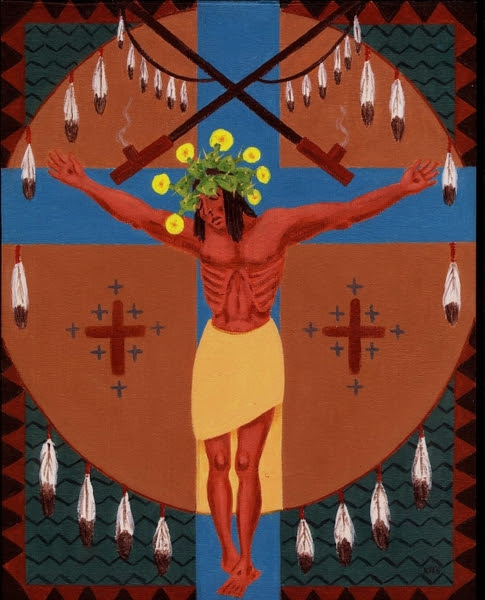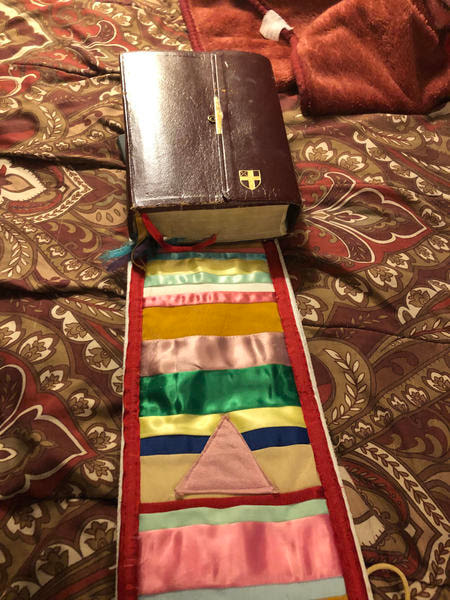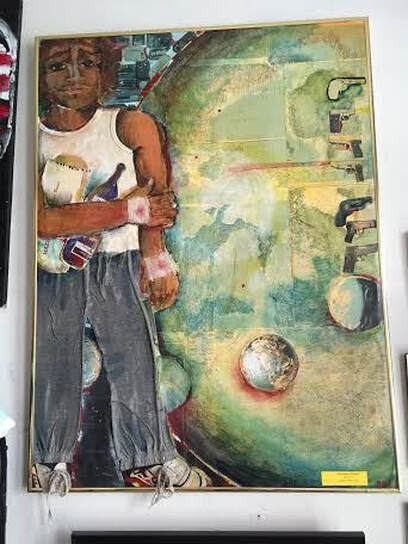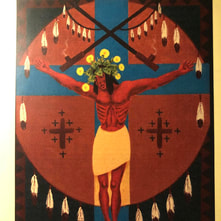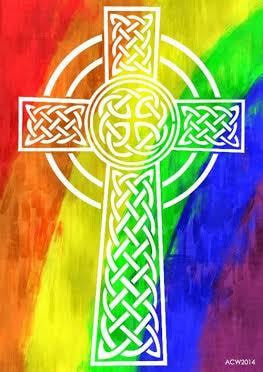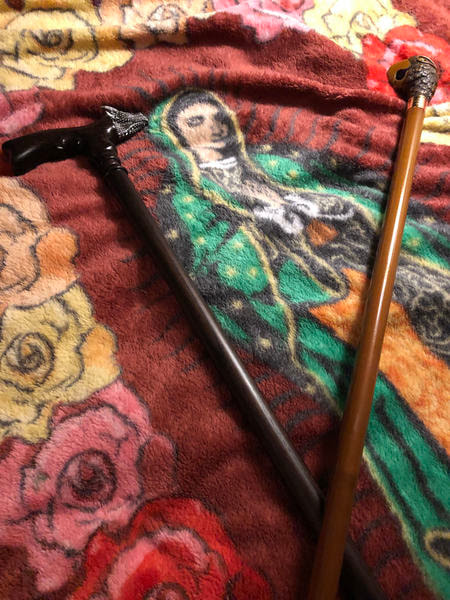The Jerod's of San FranciscoOn and In our Hearts
Matthew 22:1-14 There are times I am sitting at lunch with friends who live in Marin, Sausilito, Pacific Heights, and other wealthy areas, and the question will be asked: "River, what can you tell us about the homeless problem, what is going to be done about it?" After seeing my face, the subject is quickly changed, for I hate the question, a question with no answers, and a question that brings up much personal pain seeing the faces of so many who live and die on the street. In those moments my thoughts go to Jerod, whom I met when he was 14. He came from a good family in Sausilito. Jerod had a troubled adolescence, and could not get along with his stepdad, he ran away. I met him on Polk, where he was prostituting, he was into speed. Read more...
Over the next three years we became friends, he went home a couple of times, but always came back to the streets, and I became acquainted with his parents. One rainy night he called, asking for a place to stay, and I told him yes, I waited and waited, but he never showed. I received a postcard from Paris, telling me how much fun he had days later. His parents looked for him until a number of years later they had to move, to get away from the memories, the fear, and the pain. In all probability he was trafficked, simply picked up and taken away. Boys are trafficked just as much as girls, but it is hard for parents and others to face the fact boys are used in such a way. I see many other young boys become forty-year-olds panhandling and sleeping in our alleys. So the only solution I know is to love each one, to let them enter into my heart, to suffer with each one, to pour out my own blood if necessary, for each is the broken body of Christ. To give without expecting anything in return. As Dorothy Day once commented: "The only solution is love!" This is my solution! Get dressed for the Wedding Banquet! Let Christ clothe you with the joy of compassion. Deo Gratias! Thanks be to God! |
Mary Mother of Mercy!The Assumption of Mary!
August 15, 2022 Revelation 11:19a; 12:1-6a, 10ab; Luke 1:39-56 Janet provides the following reflection on her painting of Mary, Mother of Mercy: "Beloved mother Mary protectively and lovingly holds humanity within her mantle. As she loved Jesus so she loves each one of us. Three racially diverse subjects serve as the inspiration for the figure of Mary thereby contributing to a genuinely inclusive and invitational interpretation. The Blessed Mother does not tower over the people within her mantle rather she is a similar size, familiar and relatable. Mary the unifying force, rises up with outstretched arms holding us within her love, her hands gripping her mantle with strength. The inclusive subjects within Mary's mantle, archetypes symbolizing a small portion of the human race, honor diversity. . . ." Read more...
The Dish Washer's Son, Some Border's You never Cross, by Mike J. Quinn is a book about Frank, whose mom was married to an undocumented immigrant, his father. He simply disappeared one day. Frank did not have a birth certificate being born at home.
At 17 Frank hangs out with the "vigilantes" to chase down undocumented individuals in the desert. In a raid on the Taco Bell where he worked, he was picked up by the authorities and sent to Mexico, where he did not even know the language. In the process, he met his dad's family, where he discovered he died trying to return to the United States. Frank came to appreciate his heritage. He henceforth proudly described himself as Mexican American. This book goes into the shades of crossing the border, the dangers, and the treatment of immigrants by the border patrol. My heart remembers fifteen-year-old Diego, who was an illegal immigrant. He came to the United States to make money for his family, working as a sex worker. Diego was kind, sweet, and caring. He loved his family with all of his heart. In the two years he was here he became HIV positive, developing into AIDS, and one night a "john' called the police, and Diego was deported. Two years later a letter arrived from his mother telling me he had died. On this "Feast of the Assumption of the Virgin Mary" let us remember "Mary, the Mother of Mercy", whose hands reach out to all. Mary, the Mother of Mercy, raises the questions about immigration, and asks: "Why do we need borders?" for we are all of the same family? Deo Gratias! Thanks be to God! ------------------------------------------- Fr. River Damien Sims, sfw, D.Min., D.S.T. P.O. Box 642656 San Francisco, CA 94164 www.temenos.org 415-305-2124 |
FaithThe writer to the Hebrews writes:
"The fundamental fact of existence is that this trust in God, this faith, is the firm foundation under everything that makes life worth living. It's our handle on what we can't see. The act of faith is what distinguishes our ancestors, set them above the crowd." (11:1-3). Read more...
During the past years of the pandemic, I have been asked many times about faith as I have been holding the hands of injured and dying. I have questioned and continue to question my belief in the midst of the desolation around me on the streets, the continued attacks on faith on social media, and everywhere one turns. I have remembered these years is in spite of my degrees, and ordination, I am simply a Grocer's Son. My dad owned a grocery store, as did his before him. And I remember him as a man of strong faith, with which he lived and died. A simple faith, a childlike faith, which he bequeathed to his son. My dad's love of Jesus gave him a heart of compassion. No one ever came to our store, or house and went away without food or clothes. From him, I learned the words of Henri Nouwen in practice: "Compassion asks us to go where it hurts, to enter into the places of pain, to share in brokenness, fear, confusion and anguish. Compassion challenges us to cry out with those in misery, mourn with those who are lonely, and weep with those in tears. Compassion requires us to be weak with the weak, vulnerable with the vulnerable, and powerless with the powerless. Compassion means full immersion in the condition of being human." My dad taught me that nothing human is alien, as described by Fr. Henri Nouwen: "Through compassion, it is possible to recognize that craving for love that people feel resides also in our own hearts., that the cruelty that the world knows all too well is also rooted in our own impulses. Through compassion, we also sense our hope for forgiveness in our friends' eyes and our hatred in their bitter mouths. When they kill, we know that we could have done it; when they give life, we know that we can do the same. For a compassionate man or woman nothing human is alien; no joy and no sorrow, no way of living and no way of dying." This came from my dad's strong faith, which he shared with me. I was raised in the church, remembering at four years old being taken to the communion rail to receive the Sacrament of Holy Communion and told, "This Sacrament is for everyone, regardless of age, color, or belief." I have never refused anyone Holy Communion. I met the presence of the real Jesus of Nazareth and was called to ministry, through my dad's faith. His faith sustained him through lung cancer, and at his death, remembered telling others "My dad taught me by example to open my heart to love everyone, and meet them with an open heart, regardless of the pain. For each is a child of God." We all want to believe, to be loved, we join groups, spend hours on social media, and follow leaders when what we are seeking is to experience God's love in all of the wholeness Christ gives. Marianne Williams comments: All human behavior is love or is a call for love." Every aspect of our behavior is a desire for love. My challenge to all of us is to look at our behavior and ask ourselves the question, "Aren't we really looking for love?" And if we give care to one another daily, what would our world look like? If we call someone? If we invite someone to dinner? A young twenty-two-year-old college student told me, "I am going to be selfish until I make big money and then give it to the poor?" If we simply feed someone, or talk to a person, it will amount to a great flower of giving. For me, the answer is in Jesus of Nazareth, the one who challenges me every day to feed the hungry, and care for each person I come in contact with. To open my heart, and be hurt. I am only a "Grocers Son", a grocer show shared his love of people each and every day! Deo Gratias! Thanks be to God! ------------ Fr. River Damien Sims, sfw, D.Min., D.S.T. P.O. Box 642656 San Francisco, CA 94164 www.temenos.com. -------------------- Jeffrey and Sallie Piel have given a gift: "In honor of my grandmother Marie Mills, August 1891-August, 1969. |
Book Report and Reflections on Why Do Nations Rage?
|
A Review of The Eyes of God: A Fisherman's Tale by Marilyn Huntsman and Bibliotheca. Volume 5
Translation from the Original Tongues being the Version set forth
Anno Domini 1611 1881 The American Edition 1900 Newly Edited 2016 Ms. Huntsman springs for us a tale of Simon Peter beginning at the very start of his meeting Jesus and ending with his own death upon an upside-down cross. Read more...
She rounds out her talk with the description of his having two wives and two children, his boy died due to persecution against Peter, his daughter had a son before his death.
In the reading of the times in which the Church was founded, one reads of division, much as today, as people moved away from the central tenets of the teachings of Jesus, into their own cultural biases. One is taken by the violence throughout their time, which seemed very little different from today. The difference was there was no atomic bomb or means of destroying the climate. Ms. Huntman concludes with Peter being moved to Rome for trial as the leader of the Christian movement, and finally, crucifixion on a cross upside down. This is a very readable and touching book. She has done excellent research on the politics and the events of the time and bases her novel on the overall Biblical story. -------------------------------------------- Bibliotheca. Volume 5Translation from the Original Tongues being the Version set forth Anno Domini 1611 1881 The American Edition 1900 Newly Edited 2016 Bibliotheca. Volume 5 is a newly edited version of the King James Version. It conveys the poetic beauty of the original King James and is easily readable. Personally, the dignity and beauty of the language led me to read through this version in two days. It draws one into scripture. The editors allowed the words to flow freely by removing all verse numbers, and it was like reading a typical book. Following the tradition of the King James Version, it does not use inclusive language. Acknowledging the same translation faults as those of King James, this book is highly recommended for its magnificent readable language. We live in a time of a continual flow of news, and of spreading gossip on social media. A time when anger rages, and Christianity is under attack. There is little positive news on faith in Jesus of Nazareth on social media and in the news. We hear nothing of the social justice work of the various religious groups, nothing of people sharing their positive relationship with God. Personally, I am shredded to pieces over my faith. But what I have found over and over is that "if you want to save your life, Jesus said, "you must first be willing to lose it. You must be willing to take up your cross and follow me"--yes even through the Valley of the Shadow. For the Kingdom of heaven will cost you not less than everything. But here is a great secret: even when you only catch it in glimpses, like lightning flashing from east to west the kingdom of heaven is already you. And in this kingdom, all are welcome: The people walking by the window of the restaurant next door, on their way to a party. The homeless man on the corner, talking crazy, the young man on the corner selling drugs. All of us. Here, they that mourn will be comforted: the parents of the young man who committed suicide in Texas, the street youth who found out his parents are dead, and could not go to the funeral, and the young homeless girl with brain cancer. Here, where crosses can be so heavy, burdens are quietly made light. And when one's eyes open as a child's one will catch sight of the smile of another. Then: "Wow", he says, and smiles! These two books reminded me to "smile again! Deo Gratias! Thanks be to God"! ------------------------ Fr. River Damien Sims, sfw, D.Min., D.S.T P.O. Box 642656 San Francisco, CA 94164 www.temenos.org 415-305-2124 |
|
Tonight I picked up this year's Christmas cards. It will take me four months to address and write a note to my friends and supporters. Christmas is not a literal fact, but a mythological view of the incarnation.
In the same way, I view Christmas, our author approaches the book of Ephesians, from a mythological point of view. A myth is a story we do not take literally but speaks the truth. Ephesians was written a few years after the death of Paul, as a means to help the church to understand the Gospel apart from the early belief of the Second Coming, and to help keep people true to the Gospel in light of the many religious expressions around them. Its author used the pseudo name of Paul to give it more authority. Using the Buddhist approach of Zhirtis the author raises the understanding of the Trinity to a new level, seeing the emptying of God into believers and bringing the believer into a new source of awakening practice. In the cosmic vision, Read more...
Ephesians focuses on the fullness of God in which the Spirit takes on the mind of Christ and sums up all meaning, the cosmic equivalent of the parousia (Second Coming) that had not materialized. Because the end had not come, the author of Ephesians replaced the coming of Christ in linear time (parousia) with the spatial fullness of the cosmic Christ, our life on earth expands in a tripartite pattern that is concretizing ultimacy in the incarnate Christ by Spirit approach. Christ followers are to put on the mind of Christ--which means to embrace the dying of Jesus, as our own, to be united in the likeness of his death, and abandon the illusion that we foster in sinful hatred and lust, as well as the delusion that a distant God will spare us from suffering and death. It is better to follow the path, to have faith because we do not know where this universe will unfold because the vastness of the universe defeats our visions. Far from seeing into the vastness of cosmic evolution, we can see only our cosmic past as we examine the light from galaxies and stars in the heavens. We know nothing of the evolutionary path, of the vastness of the universe, and so our gospel path is to abide in Christ without knowing any of that. Being in the now, in this moment of living is all we have, our days are in Eternal life. Our calling is not to ourselves but to the cosmos. We are all one family, we are not owners of the Earth and our hope is to be one in all things. Keeman brings our faith in the Cosmic Christ down to earth, seeing ourselves as very minute, and trusting in God calls us to not judge, and to care for each other. -------------- Fr. River Damien Sims, sfw, D.Min., D.S.T. P.O. Box 642656 San Francisco, CA 94164 www.temenos.org 415-305-2124 |
Peniel
|
IN Service We Encounter God!"For the grace of God, bringing salvation to all people.(Titus 2:11).
My journey has been one of seeking salvation. I was raised in a conservative environment and taught the only way to heaven was through Jesus, repenting my sins. I experienced baptism as a Baptist, Methodist, Roman Catholic, and Episcopal through this journey. I was given books to read on the sins of masturbation, having sex outside marriage, drinking alcohol, smoking pot, and cussing, among other things. These were sins keeping one from God. Therefore, since I could not refrain from sinning, my life was overwhelmed by guilt. I have been told you have to pray a certain way, like using the Lord's Prayer in a Eucharist Service or believing in certain ways to be a part of a community. Through the years of facing death, and horrors on the street, my faith and journey are summed up in the following quotes: Mark 12:28-34: ". . .Hear Lord O Israel, the Lord our God, the Lord is One. And you shall love the Lord thy God with all your heart, mind and strength and your neighbor as yourself. ." Read more...
and in the words of Fr. Henri Nouwen: Radical servanthood does not make sense unless we introduce a new level of understanding and see it as the way to encounter God. To be humble and persecuted cannot be desired unless we can find God in humility and persecution. When we begin to see God, the source of all our comfort and consolation, in the center of servanthood, compassion becomes much more than doing good for unfortunate people. Radical servanthood, as the encounter with the compassionate God, takes us beyond the distinctions between wealth and poverty, success and failure, fortune and bad luck. Radical servanthood is not an enterprise in which we try to surround ourselves with as much misery as possible, but a joyful way of life in which our eyes are opened to the vision of the true God who chose to be revealed in servanthood. The poor are called blessed not because poverty is good, but because theirs is the kingdom of heaven; the mourners are called blessed not because mourning is good, but because they shall be comforted. Here we are touching on the profound spiritual truth that service is an expression of the search for God and not just of the desire to bring about individual or social change." This has been my journey! John Milton once said, "They also serve who only stand and wait." This past year I have done a lot of standing and waiting, and have found God in prayer, and talking to people. We all can serve in our own way! ---- Fr. River Damien Sims, sfw, D.Min. P.O. Box 642656 San Francisco, CA 94164 www.temenos.org 415-305-2124 |
"God Stays With Us!"Luke 11:1-13
The Message Ask for What You Need 11 One day he was praying in a certain place. When he finished, one of his disciples said, “Master, teach us to pray just as John taught his disciples.” 2-4 So he said, “When you pray, say, Father, Reveal who you are. Set the world right. Keep us alive with three square meals. Keep us forgiven with you and forgiving others. Keep us safe from ourselves and the Devil.” Read more...
5-6 Then he said, “Imagine what would happen if you went to a friend in the middle of the night and said, ‘Friend, lend me three loaves of bread. An old friend traveling through just showed up, and I don’t have a thing on hand.’ 7 “The friend answers from his bed, ‘Don’t bother me. The door’s locked; my children are all down for the night; I can’t get up to give you anything.’ 8 “But let me tell you, even if he won’t get up because he’s a friend, if you stand your ground, knocking and waking all the neighbors, he’ll finally get up and get you whatever you need. 9 “Here’s what I’m saying: Ask and you’ll get; Seek and you’ll find; Knock and the door will open. 10-13 “Don’t bargain with God. Be direct. Ask for what you need. This is not a cat-and-mouse, hide-and-seek game we’re in. If your little boy asks for a serving of fish, do you scare him with a live snake on his plate? If your little girl asks for an egg, do you trick her with a spider? As bad as you are, you wouldn’t think of such a thing—you’re at least decent to your own children. And don’t you think the Father who conceived you in love will give the Holy Spirit when you ask him? Yesterday afternoon on Haight I ran into Reddick, who is 11, (not his real name) and was in a group of homeless people. And as I handed out different items, he asked: "None of this has been dosed has it?" (LOL), meaning injected with LSD, mushrooms, or another drug. I smiled and said, "No," and I shared the time I was "dosed" and had to go to the hospital. His mom, whom I have known for several years, asked me to take him for something to eat since he had not eaten all day. We crossed the street to have pizza and shared our "war stories". He had had many, and in looking back to when I was eleven, thought "you are old," for my childhood was playing games. Reddick's mom was born, raised, and prefers to live on the streets. "Flower Girl," sees herself as a "gypsy", moving from place to place, living outside. Continuing down the street, sitting alone, was an older man, as I handed him a pair of socks and food, he rose up and pushed me against a car, hitting me in the chest several times. I simply pushed him back and in the words of Jesus, "shaking the dust off my feet". It has been suggested by friends it is time for me to remove myself from "A violent environment with violent people." And the question I raise, is "Where might that be?" My shoulder was broken by a wealthy person in Marin. He always carries a huge stick for his "protection", saying it was an accident. I have been threatened by more people who are housed, than unhoused. There is violence in all areas of the City. No one is safe from violence. I have more true friends who are the poorest of the poor than otherwise. There is a quote from the series Bluebloods" that carries meaning for me "Down these mean streets a man must go who himself is not mean, tarnished or afraid." The streets have given me three gifts: learning to live in the moment, and secondly, seeing success in caring for each person I come in contact with. I really do not know if our earth, let alone our civilization will survive this century. Considering the ignoring of climate change, the divisions of people, and the continuing growth of poverty there is reason to wonder. But what is important to me is not if our world will survive or not but if we can continue to live with hope, and trust in the promise of God to stay with us at all times. He is the God of the living. Jesus has overcome evil and death and his love and compassion are stronger than any form of death or destruction. That is why I feel that we should continually avoid the temptation of fear, and despair and deepen our awareness that God is present in the midst of the chaos that surrounds us and that presence allows us to live in joy. How do I know: Simply because that trust has saved my ass, many times, and is my ultimate hope and joy! ---- Fr. River Damien Sims, sfw, D.Min., D.S.T. P.O. Box 642656 San Francisco, CA 94164 www.temenos.org [email protected] |
"Looking Death in the Eye!""Death has been swallowed up in victory.
Where. O death is now thy sting?.. But thanks be to God who gives us the victory through our Lord Jesus Christ"( I Corinthians 15:57-58). For the past three years, I have looked death in the face often, but no more so than when sitting at Club Trinidad in Palm Springs, on my birthday in 2021, talking on snap chat to a fifteen-year-old in Texas. Skip (not his name) blew his head off. I see the blood spattering all over the computer screen in my dreams from time to time. I have realized that accepting death is not making a mountain out of a molehill. Death is real, it will come, calling us to walk with others, helping them to find hope in the midst of the chaos around us. Life is preparation for death, fear of death keeps us from living. Read more...
Paradise is not a place, but participation in our inheritance of the resurrection, it is here and now, and we are to make every moment count. Through the past year and two months, I have learned that choosing joy in the midst of chaos gives us hope. I have learned the meaning of life is to rejoice in the words of Jesus when he tells us: "I am the resurrection of life." Let us rejoice in the resurrection. Choosing joy in all things leads to a tenderness which leads to a transformation. Tenderness leads to loving with more vulnerability. In trying each day, and it is hard as hell, to keep my mind where my body is, I can find joy at the moment, and be more tender. It seems the closer I come to death, the closer I come to the poor and broken people on the street, and see that same brokenness in everyone. I find it my desire to be present to people, and the less I feel impelled to deal with the burning issues of our day. My new tattoo, the butterfly, above is symbolic of the resurrection, and of a renewed commitment to keeping my eyes on the prize until the day death brings me into the presence of Jesus and I hear the words, "Well done, my good and faithful servant". Deo Gratis! Thanks be to God! ------------------------ Fr. River Damien Sims, sfw, D.Min., P.O. Box 642656 San Francisco, CA 94164 415-305-2124 temenos.org --------------------------- "God wants you to see things differently. He wants you to see all that you are capable of doing, being, and becoming. With this new sense of yourself, he wants you to live differently" (Matthew Kelley). |
Walking Into Joy and Tenderness!"in the new light of each day's questions, I am never prepared.
Today again I have nothing, to offer but a handful of old prayers worn down by the relentless abrasion of doubt, and a fragment of dream that plays on in my head only half-remembered. Still, the doves coo and circle through the pines as they do when I pass each morning. Their sorrow is so nearly human, it rings sweet with regret. By dusk, the trees will bow down, and I too, will make my appeal, will find again your mercy, your solace. (Elizabeth Drescher) A student participated in outreach with me Thursday night and talked of studies he had read on how to end homelessness. Looking around to see tents, and people on the street now for nearly twenty-seven years, I listened, and we walked on. Read more...
"in the new light of each day's questions, I am never prepared. Today again I have nothing, to offer but a handful of old prayers worn down by the relentless abrasion of doubt, and a fragment of dream that plays on in my head only half-remembered. Still, the doves coo and circle through the pines as they do when I pass each morning. Their sorrow is so nearly human, it rings sweet with regret. By dusk, the trees will bow down, and I too, will make my appeal, will find again your mercy, your solace. (Elizabeth Drescher) Friday afternoon in the Haight there was a stabbing, and as I held the young man in my arms while waiting for an ambulance, my arms and clothes were bloodied. A nurse walked out of the examining room and guided me to a shower, gave me some scrubs, and told me to shower, handing me disinfectant soap, for the young man had monkeypox. "in the new light of each day's questions, I am never prepared. Today again I have nothing, to offer but a handful of old prayers worn down by the relentless abrasion of doubt, and a fragment of dream that plays on in my head only half-remembered. Still, the doves coo and circle through the pines as they do when I pass each morning. Their sorrow is so nearly human, it rings sweet with regret. By dusk, the trees will bow down, and I too, will make my appeal, will find again your mercy, your solace. (Elizabeth Drescher) In the last four years, as I have struggled through the injury of a shoulder, my hip, a stabbing, and the coronavirus, I have learned to let go, and find joy in all situations. To begin to enter the mystery of life. Entering the mystery we are no longer afraid of pain, but embrace it, and in doing so become tender with others. Tenderness is revealed in the understanding of presence within the midst of annoyance, and to see every person as simply our brothers and sisters. Tenderness is letting people enter into our hearts, being vulnerable, knowing full well we will be broken, but like the Velveteen Rabbit was told, "Now you shall be Real to everyone." Tenderness is enduring love that sustains anything, offering no judgment, simply care. Tenderness is letting go of the false god of success and finding joy in serving others. Tenderness is knowing Paradise is not a particular place, but a participation in the here and now for Jesus is the Resurrection in our midst. Tenderness is not about saving people but redefining lives into one another. Simply loving people. Choosing joy leads us into a life of transformation, into a life of service in tenderness. Letting go of the fear of death, and living in the moment, allows us to choose joy. Find joy in the here and now, find joy in being tender to others! What a gift! "in the new light of each day's questions, I am never prepared. Today again I have nothing, to offer but a handful of old prayers worn down by the relentless abrasion of doubt, and a fragment of dream that plays on in my head only half-remembered. Still, the doves coo and circle through the pines as they do when I pass each morning. Their sorrow is so nearly human, it rings sweet with regret. By dusk, the trees will bow down, and I too, will make my appeal, will find again your mercy, your solace. (Elizabeth Drescher) Deo Gratias! Thanks be to God! -------- Fr. River Damien Sims, sfw, D.Min., D.S.T. P.O. Box 642656 San Francisco, CA 94164 www.temenos.org 415-305-2124 |
A Review and Reflection on Monastic Disciplinesby Sam Hamstra, Jr. and Samuel Cocar
Hamstra and Cocar in 145-pages review the disciplines of the desert fathers and hammer on the reality of the failure of the institutional Church. The institutional Church has become a shell, steeped in secularism. They present the basics of the desert fathers as found in the early Church, which kept their faith blazing. The Little Office: Giving, Prayer, and Fasting, the core Triad of Practice: summarizing Matthew 6:1-16, introduced by Jesus as a regular role of the Christian life., "So when you give to the poor, do not sound a trumpet before you, as the hypocrites do in the synagogues and in the streets, so that they may be honored by men and women." Read more...
The first practice is giving. We should give as much as we can, and live simply. The authors suggest tithing, giving 10 percent of our income to the poor, and the disenfranchised: "it functions as an act of faith in God's promise of provision; a tutor for personal, planned, and proportionate giving (I Corinthians 16:2); and a weapon for victory over materialism." Henri Nouwen describes in more depth our journey of giving: "We who want to bring about change have first of all to learn to be changed by those whom we want to help. This, of course, is exceptionally difficult for those who are undergoing their first exposure to an area of distress. They see poor houses, hungry people, and dirty streets; they hear people cry in pain without medical care, they smell unwashed bodies, and in general, are overwhelmed by the misery that is all around them. But none of us will be able to really give if he has not discovered that what he gives is only a small thing compared to what we have received. When Jesus says: “Happy the poor, the hungry, and the weeping” (Luke 6:21), we have to be able to see that happiness. When Jesus says: “What you did to the least of my brothers, you did to me” (Matthew 25:40), he is addressing to us a direct invitation not only to help but also to discover the beauty of God in those who are to be helped. As long as we see only distasteful poverty, we are not really entitled to give. When, however, we find people who have truly devoted themselves to work in the slums and the ghettos and who feel that their vocation is to be of service there, we find that they have discovered that in the smiles of the children, the hospitality of the people; the expressions they use, the stories they tell, the wisdom they show, the goods they share; there is hidden so much richness and beauty, so much affection and human warmth, that the work they are doing is only a small return for what they have already received." "When you pray, you are not to be like the hypocrites; for they love to stand and pray in the synagogues and on the street corners so that they may be seen by men and women."(v. 2.) Prayer, the second triad, is broadly considered communication with God-communication understood "as meaningful, interactive self-disclosure." We talk to God daily, we pour out our hearts. Prayer is more than just asking God for our needs. I spend my life having people ask me everything. It gets absolutely tiring to the point of taking three days off a month, and two weeks a year totally alone, with the phone off. God created us to praise, and simply be in his/her presence. (Psalm 63). Prayer is at the center of Christian spirituality, whatever strand of Christian tradition one enters. Evagrius, spokesperson of the Orthodox tradition: If you are a theologian, you will pray truly. And if you pray truly you are a theologian." We all struggle with the practice of prayer. Prayer is a powerful force. But pray, until the sweat from your brow pours out the presence of God. The final practice of the core triad is fasting: "Whenever you fast, do not put on a gloom face as the hypocrites do, for they neglect their appearance so that they will be noticed by men and women when they are fasting." (v. 16) Richard Foster argues the most important text in the Bible for establishing the importance of fasting is Matthew 9:14-15: "Then the disciples of John came to him saying, "Why do we and the Pharisees fast but your disciples do not fast.. And Jesus said to them, "Can the wedding guests mourn as long as the bridegroom is with them? The days will come when the bridegroom is taken away from them, and then they will fast." signifying that when Jesus is gone his disciples will fast. Fasting is an exclamation point at the end of the sentence: "We miss you! We want you! We can't wait until you come back!" When we fast we are witnessing the exclaiming, "Maranatha! Come, Lord Jesus!" We can fast in various ways: sitting down with someone on the street and giving of our time; working in an agency; fasting a day a week, and giving our money to a homeless person. There are many ways. This is a revolutionary vision, for as the Gospels show, Jesus did not closely identify with people from the elaborate metropolitan centers that housed the political, military, economic, and religious elite. He more closely identified with the working poor who built and sustained those centers and the often destitute people from backwater villages. Starvation, indebtedness, imprisonment, exploitation and violence were crushing realities that marked life for those who lived under Roman occupation in first-century Palestine (Sound familiar). It was in these boundaries that the revolutionary vision of Jesus, God's Reigh found its gravitational center. Today Jesus continues to understand the dehumanization of people through homelessness, lack of health care and struggles simply for daily living. He understands the yearning for water, bread, shelter, land, safety, and justice. It moved and moves him deeply because liberation from the yoke of oppression is always to be at the center of God's Reign. The "Little Office", brings us into line with Jesus so that we may become his hands, feet, and mouth! Deo Gratias! Thanks be to God! -------- Fr. C. River Damien Sims, sfw, D.Min., D.S.T. P.O. Box 642656 San Francisco, CA 94164 www.temenos.org 415-305-2124 |
PRIDE, 2022Journal of an Alien Street Priest:
San Francisco Pride, yesterday, was full of protest over the recent Supreme Court decision and full of joy, and pride over the freedom the LGBTQ community enjoys today. For over twenty years Temenos has been in charge of the Accessibility area, where seniors and people with disabilities sit. We had youth working, as you can see from our photos: Read more...
From different backgrounds, one homeless youth, and three others worked for us on this Pride Sunday.
Looking back through the years, seeing the countless youth we have worked with at Pride and all the youth they represent, witnessing their pain, confusion, fears, and desperation, we cry, we smile, and we give thanks to God for allowing us )and I mean all of us) the honor. People often wrestle with what we do, and looking at the faces of these young people--they are what we do. Listening, simply listening moment to moment, giving them of our time, the two greatest gifts of all. A number of years ago an outreach worker from another agency walked with me on the street. And as we always do we listened, gave food, and socks, and moved on. Sometimes we listened for an hour. In the end, this young worker, commented, "We have to carry a clipboard and check off how many people we see, required to talk with a certain number, and only certain ages, you simply spend time with everyone, and for as long as needed. How awesome that is." Our ministry is that of a pastor, who listens, and shepherds his flock. We hurt, we cry, and suffer along with these guys. Sitting at the base of a statue yesterday waiting for two of our workers, a young man, dressed in a skimpy leather outfit was crying. Someone had taken a picture of him and sent it to his dad. He said his dad would beat him because he was gay. He was afraid to go home. I gave him a card and told him to call me if that happened. I hear stories similar to his day in and day out. Homophobia is well and alive! San Francisco is different than most parts of the country and California itself. Homophobia is WELL AND ALIVE. It is deadly! Today's lesson from Matthew 8:18-22 where Jesus calls all of us to follow him with radical discipleship. He understands the way discipleship can be challenging, which is how we get to the non sequitur: "Foxes have dens and birds of the sky have nests, but the Son of Man has nowhere to rest his head.' We might read that line, wonder at the meaning, and simply move on, but it has meaning for us today. If we say that we will follow Jesus wherever he leads, do we understand that it will not be easy, that we too may find ourselves with nowhere to rest our heads? We don't get salvation without sacrifice, without embracing the radical--letting the safety nets drop away and trusting that God is the only security measure we need. Jesus calls us to embrace the radical! To go out and feed the hungry, clothe the naked, sit with the dead and dying, to walk and listen, and protest until our government leaders listen! Following Jesus is radical! Deo Gratias! Thanks be to God! ------------------------ This month we will continue our basic schedule of outreach five days and nights a week; talking to people on snap chat and phone. Thank you for your support during this first half of the year and hope you will remember us during July, money is short, and expenses for supplies continue to be needed. When I use "we" I simply mean those who have supported us financially, and with prayer are walking on the street as well, symbolically. Again we are beggars and we thank you for your support! Paypal and website: www.temenos.org |
LGBTQ+ Pride Month!On June 25 and 26 we will have our Pride Celebration. A million people will descend upon San Francisco, the flags flying, beautiful people around. A celebration of LGTBQ+ equality.
Our open and affirming churches will celebrate with the rainbow flag on their doors, and there will be sermons preached on equality. Yet in this celebration, we all fail to remember the individuals who have been persecuted, and psychologically damaged; and fail to remember the ones who are struggling. We think that it is better to ignore the past and look to the future, and yet the past will continue to haunt us until we embrace it and are reborn into a new life and understanding. Read more...
Personally, I am just beginning to begin putting the pieces together through the homophobia and hate experienced in the Church. I think of her as both my mother and a whore, as Dorothy Day commented.
Through my growing up years, and seminary I encountered ministers, who struggled with being gay, suffered from homophobia. One whom I will call Charlie, never married, suffered greatly, and being called to ministry Charlie believed he needed to stay in the closet. He ended his life at 40. He is one of the thousands. Every day I hear the stories of young men and women in their struggles and have been alienated from family, and friends. Four out of ten queer youth will commit suicide. I see parents while expressing their openness are happy, very happy when their child dates the opposite sex. Homophobia is engrained a little in all of us. Our lectionary text today is from Ezekiel 34: 15-16 calls us to be “shepherds”, to care for those who are “lost”: “I myself will be the shepherd of my sheep. I myself will make sure they get plenty of rest. I will go after the lost, I will collect the strays, I will doctor the injured. I will build up the weak ones and oversee the strong ones so they are not exploited.” Each one of us is called to be “shepherds” to those who are broken and coming out; we are called to feed and care for our brothers and sisters on the streets. Deo Gratias! Thanks be To God! (We are in charge of the Accessibility Booth at Pride in which provides the ministry of presence in welcoming individuals.) One hundred million wanderers Line the streets the sand the oceans Line borders marked with barbed wire Or impenetrable walls Seeking Hope Karen Melander-Magoon, D.Min. |
The Art of Marketing Jesus Unleashing the POWER OF THE GOSPEL through the Lives of Every day Peopleby Robert Wachter
The author describes Jesus as the "most attractive person in human history". The Art of Marketing Jesus is an easy-to-understand spiritual growth process that has helped many believers internalize the life-giving promises of the new covenant and produces an abundance of love, joy, and peace in their lives--which is precisely the attitudes and characteristics required to attract people to Jesus If you want to live free and attract more people to Jesus, perhaps it's time to become a new wineskin. It is time to say goodbye to old thoughts that keep us in bondage and place your light on the lampstand of spiritual freedom. What he is saying is very simply said by Jesus, "You shall love the Lord your God, with all of your heart, mind, and soul, and your neighbor as yourself." To care for people without expecting them to be what we want them to be, but simply as the broken children of God as we are. Deo Gratias! Thanks be to God! |
A Reflection On Inflamed Deep Medicine and the Anatomy of Injustice!By Rupa Marya and Raj Patel
"Don't pick on people, jump on their failures, criticize their faults-unless of course you want the same treatment. ." Matthew 7:1-5 Marya and Patel open with these words: "Deep medicine is the birthing of resistance to the oppression of those forces that keep us from being our true selves. .and engaging in deep medicine means understanding how every human's internal state synchronizes with the environment around them and helping them that DIALOGUE THAT SPEAK IN AS MANY LANGUAGES AS POSSIBLE." Read more...
By "speaking in as many languages as possible," we come together listening and coming towards understanding each other and supporting and caring for our fellow human beings and our environment.
Presently we are not listening to the language of others Rupa predicts, as a native of India, by looking away and not seeing,"the disparities of India were not the past of a backward nation, they were the future of places like the United States." My "dark night of the soul" came to me in seeing people on every corner sleeping in doorways, without blankets; mental ill and substance abusers walking around naked, witnessing the death of a youth on snap chat, and holding the hands of others dying from being stabbed, shot, and a number dying from the coronavirus. Housing, food, gas, and medical care are only available to those with money. We are becoming a country with a rich-poor divide. It literally tears my heart apart. I am nauseous and wonder what has happened to us as human beings. Patel tells us: "We can be healthy only when the entire community is also healthy meaning all beings: plants, animals, water, people, soil, and air, the ancestors, and those not yet born. And this is achievable only through social, economic, political, ecological, and cosmological spheres working in an integrated fashion for the benefit of all, not just for a privileged few.. " . During Pride month I remember queer youth are 4 times as likely to commit suicide than their straight peers. All over social media, the news, and where politicians speak we hear the hateful thoughts and words, churches and other institutions ignore queer youth. Violence results from the way Blacks and minorities are treated in actions and words. I was told recently that I was as tough as nails (LOL), I hear more words of hate and threatened violence than pleasant words. I suffer a lot from those words, I cry a lot, and suffer my own sense of failure. Our words and actions are where we start in saving our environment and we can in little ways. Today watching seated at a restaurant, people passing by, and their interactions with a homeless man sitting on the street. Out of one hundred and fifty, not one spoke to him, it was as if he did not exist. We can by speaking to our brothers and sisters on the street, give them a sense of being cared for, and will lead us to work in ways to provide for them. We need to be human beings to others.t We can begin by seeing our responsibility for the violence in our society, through the ways in which we treat minorities in words and our actions. In summary, the most important action we can do is to simply listen and "become humble once more in the face of life's greater intelligence. It is to create a community of care that can heal what has been broken, in which we can call take part with fire in our hearts, to cool our veins, our minds, our communities, and our planet, with recognition of our dependent we are on water,wind, earth, fire and the entire web of life. It is to become human again."" Fr. C. River Sims, D.Min., D.S.T. P.O. Box 642656 San Francisco, CA 94164 www.temenos.org |
The Dazzling Darkness!II Kings: 11:-4;9-18,20
Matthew 6:19-20 One of the most compelling images of our lives comes from St. John of the Cross: the dark night of the soul when the Holy Spirit leads us to the "darkness" of our own limited knowledge and awareness, it is to lead us into a hidden love that cannot be put into words or understood in a kind of logical sense. The nineteenth-century poet Coventry Patmore, offers this insight: "In the Higher Communion, the night of thought is the light of perception." Folk singer Arlo Guthrie puts it in more easy words: You can't have the light without a dark to stick it in. His point of darkness whether symbolically or in reality is not always wrong. Our bodies need darkness for a good sleep. So darkness and light are not always the symbols of good and evil. Read more...
For a long time now, I too have been experiencing this dark night of the soul, a darkness that is dazzling through over two years of the pandemic holding the hands of those dying of the coronavirus, witnessing a suicide, seeing young guys stabbed and brutalized, my own body beaten and broken, struggling to regain the ability to walk over the past year, and finally hearing very little positive.
Yet it is in this darkness there is an invitation into the cloud of unknowing: that sacred place where we meet God not by the radiance of our minds, but in a dazzling love that cannot be put into words or metaphor. The two things I am learning in this darkness are found in the words of T.S. Elliot: "Only those who risk going too far can possibly find out how far one can go." Risk is the key to growth and change. Secondly one of the greatest human spiritual tasks is to embrace all of humanity, to allow our hearts to be a marketplace of humanity, to allow our interior lives to enter into and reflect the pains and joys of people who live everywhere, and have lived before us and will live after us. To embrace and walk with every person around us. Our own lives are a part of the journey of humanity We are simply a fragment of humanity. It is that dazzling love that enables us to not be afraid to touch the lives of each person, see ourselves in them, and most importantly seeing the broken body of the Cosmic Christ. Deo Gratias! Thanks be to God! Fr. C. River Damien Sims, sfw, D.Min., D.S.T.
P.O. Box 642656 San Francisco, CA 94164 www.temenos.org 415-305-2124 We Are Beggars! Please give as you can, for as we enter the summer, our offerings are down! |
In the Mists of Time!Matthew 25:31-46
John 21: 15-19 Last week I was attending a conference in Las Vegas, and as I sat in my nice hotel room I remembered the day before walking to the post office, a young woman, butt naked, simply out of her mind wandering around; as I returned home there was a young kid, with black paint around his eyes, wearing filthy shorts, and dirty legs, and could not even focus when I spoke to him; in the doorway was another lying in her excrement; the night before I took another young man to the hospital, sick with the coronavirus. found him lying on the street in chills. Read more...
The words of Jesus echo in my ears as I see the suffering, I struggle with my privilege and hear these words:
"When they had finished breakfast, Jesus said to Simon, son of John do you love me?" He said to him: 'Yes Lord you know that I love you.' Jesus said to him, 'Tend my sheep...Jesus said to him the third time, Simon son of John do you love me?' Peter was grieved because he had asked him a third time, 'Do you love me?'. .'Truly, truly, I say to you, when you were young, you used to dress and walk wherever you wanted, but when you are old, you will stretch out your hands, and another will dress you and carry you where you do not want to go." June 4, is the anniversary of my ordination back in the mists of time, I was 21, and through the years to come I was confronted with a church that rejected me as a result of being queer, and that denominations being torn apart with the same issue; I found myself in that struggle being a hooker, and finally coming back to a new queer denomination. The call to ministry continues to burn like a fiery flame within me, in season and out of season. And the years have passed, my youth is gone, and am struggling with walking, the side effects of the coronavirus. The Church is a human institution, and as Dorthy Day once said, "The Church is both a whore and also our Mother." Looking through the years she has always been my Mother. And as I struggle with walking from an injury, and the side effects of the coronavirus, I find myself still answering the question: "Yes Lord I love you," even though like Peter I have failed so many many times. And on this anniversary I renew my vows of ordination, "To preach the Word, and Administer the Sacraments," and continue to "wait tables," My thanks to all of you who have supported me through these years! This is Pride month. The Pride celebration will be on June 25 and 26. We will be in charge of the accessibility section, and if anyone would like to volunteer please call.
In San Francisco, it is easy to think that all is well with LGBTQ rights, but throughout the country, those rights are being challenged, and people are suffering. In the past year there has been one suicide and several young people attempted to commit suicide we have worked with, and so there are many others in the closet and struggling. Forty percent of the homeless population is LGBTQ. So come to Pride, rejoice in our freedom in San Francisco, and protest the discrimination elsewhere in our state, and throughout the country. Fr. River Damien Sims, sfw, D.Min., D.S.T. P.O. Box 642656 San Francisco, CA 94164 www.temenos.org 415-305-2124 |
Walking Towards Joy!"..That was fuel on the fire. The quarrel flamed up and became violent..."
Acts 22: 30-23:11 Joy and Resentment Cannot Coexist "Of one thing I am sure. Complaining is self-perpetuating and counterproductive. Whenever I express my complaints in the hope of evoking pity and receiving the satisfaction I so much desire, the result is always the opposite of what I tried to get. A complainer is hard to live with, and very few people know how to respond to the complaints made by a self-rejecting person. The tragedy is that, often, the complaint, once expressed, leads to that which is most feared: further rejection. . . . Joy and resentment cannot coexist." Fr. Henri Nouwen Read more...
The Center for Disease Control estimates 1,002, 422 deaths and a 104, 00 getting ill daily from the Coronavirus. As of the end of last week, the Bay Area reported between 4,000 and 4500 new coronavirus cases a day--roughly double the daily reports from the start of the month.
In talking to people I hear of the numbers, and of how lucky we are with the vaccine for people who get less sick; how "blessed" they have been for living in a place where the disease is not near; and so on. I hear of "quarrels flaming up", over the non-vaccinated, and resentment towards them. We read the numbers, yet we fail to see the suffering.. Let me take a few minutes and share with you examples of the suffering: Joe: 45 years old, began feeling nauseated, and within a week was in the ICU, hooked to all of the needed medical devices. He gasped for breath, his whole body in pain, and he died in so much fear. Shannon, 20, a young street kid, began to have chills and fever, and went to the emergency room and was placed in isolation; he died in pain, and alone except for the priest holding his hand. Myself: I have had, five vaccines, from a study at Standford, yet, one morning I awoke feeling sick, nauseated, and with fever. Testing positive for the coronavirus I stayed in for three weeks, with few symptoms. Yet the lingering side effects, light as well, tiredness, complete exhaustion after being up for four hours and failing to remember names, and dates, still continue. I am more easily susceptible to other viruses. as well. I can list for hours the ones who have died on the streets, and those who have side effects far worse, much, much worse than mine. My best friend is an antivirus person, we joke, and he reminds me it is a matter of principle in his eyes, but I will never, never judge or stay away from his presence. To find more joy in our lives we need to let go of our resentment, and our anger, towrds others, for who they are; to find joy we all need to see the human toll in the suffering and pain this disease has caused. People are suffering, let us walk towards joy in seeing their suffering, and ministering to each one like our friends and neighbors. Fr. River Damien Sims, sfw, D.Min., D.S.T. P.O. Box 642656 San Francisco, CA 94164 www.temenos.org 415-305-2124 |
Journal of An Alien Street Priest:"You can measure your worth by your dedication to your path, not by your successes or failures." Elizabeth Gilbert
Luke 24:46-53 Today we celebrate the Ascension of Jesus into heaven and in two weeks Pentecost. For the modern world that is confusing and unbelievable. Yet when you understand that the Jewish mind functions in myth, and not literal understanding one can see that for them Jesus became the Cosmic Christ, the One who dwells within them in the form of the Spirit. As time has moved through the ages, this Cosmic Christ continues to evolve into seeing all spiritualities that practice the love of humanity as reflections of the One Divine Spirit. Today I sit outside a cafe on Polk Street, drinking tea, around me are people, playing with their dogs, shopping, and simply hanging out and my mind returns to coming here in 1994. Read More...
The street was full of lower-end gay bars, young boys hustling, drugs were plentiful, and as time has moved onward we have come to now, and all has changed. The same with the Haight.
Several years ago a group wanted to paint a mural of the old Polk, the bars, and the hustling, to recall a part of queer history, and the merchants association refused, they do not acknowledge that period. In so doing they erase history, and more importantly the lives of those who were struggling with coming out in a period of hatred. They forget about the youth, the drug addicts. The same in the Haight. The City continues to put out its millions to "solve the problem." The problem continues and worsens. Our ministry continues to be the Cosmic Christ to people on the street--food, pastoral care, needles, condoms, socks, and other supplies; we continue to minister without pushing religion or belief, but in love, respect, and care. As St. Francis once said, "Preach the Gospel using as few words as possible." During the past two years, we have held the hands of people dying of the coronavirus; three young men who were stabbed and shot and saw the face of one shooting himself on zoom. We see people without food, and without real friends. I can understand the Apostle Paul's words: "I have faced dangers from believers and non-believers, I have faced dangers on the deserts, the seas, and the streets. I have endured many sleepless nights. I have endured pain from injuries. I have gone without food. I have shivered in the cold without enough clothing to keep me warm. (from 2 Corinthians 11: 22). And from these years and experiences what we have learned and attempt with our heart to practice: First, not to place our expectations on others, we walk with them where they are; Second, to have no expectations of the government; Third, we have to suffer with people on their journeys in order to find life on ours; Finally see in each one the face of the Cosmic Christ, whose lives are at times touched by evil, but new life can come in love; and finally: "You can measure your worth by your dedication to your path, not by your successes or failures." Elizabeth Gilbert. Our prayer in the coming days is that we will love each person without judgment, seeing the positive, and the negative, the good and evil, and loving each as a precious child of God. Deo Gratias! Thanks be to God! Peniel--June-Pride Month
Newsletter of Temenos Catholic Worker P.O. Box 642656 San Francisco, CA 94164 www.temenos.org (pay pal) 415-305-2124 Fr. River Damien Sims, sfw, D.Min., D.S.T. Directer 2022 LGBTQ Pride will be on June 25 and 26th, and we will be in charge of the Accessibility Booth. If anyone would like to volunteer please let us know.
Pride is important this year. What we forget as each generation moves forward is many of the gains of the former are lost; We need to keep before the eyes of the world the equality of all and understand laws alone do not change the hearts of people. For only when hearts are transformed through our own witness of love can lasting change occurr. We are Truly Beggars!
We are truly beggars. Money is low! Socks are donated, but expenses regarding food, condoms, car upkeep gas, and our own living expenses have risen. So please find it within your heart to give!
You may give through Paypal; our website: www.temenos.org, or mail: P.O. Box 642656, San Francisco, CA 94164! We also have for sale the One God of the Abraham Faith Symbol for $100.00! |
Love One Another All The Way!
|
Remembering Stardust
|
Feed My Sheep!
|
The Great Digital Commission
|
Luke 24:1-12At daybreak on the first day of the week the women who had come from Galilee with Jesus took the spices they had prepared and went to the tomb. They found the stone rolled away from the tomb; but when they entered, they did not find the body of the Lord Jesus. While they were puzzling over this, behold, two men in dazzling garments appeared to them. They were terrified and bowed their faces to the ground. They said to them, “Why do you seek the living one among the dead? He is not here, but he has been raised. Remember what he said to you while he was still in Galilee, that the Son of Man must be handed over to sinners and be crucified, and rise on the third day.” And they remembered his words. Then they returned from the tomb and announced all these things to the eleven and to all the others. The women were Mary Magdalene, Joanna, and Mary the mother of James; the others who accompanied them also told this to the apostles, but their story seemed like nonsense and they did not believe them. But Peter got up and ran to the tomb, bent down, and saw the burial cloths alone; then he went home amazed at what had happened.
Read More...
I received an email from a friend describing her confusion about Easter and in a few words: "Easter" was originally designated the Jewish Passover, but as the early Christians tend to do they adopted festivals to shape it in their own belief system. It has to do with the moon cycles as well; The Bible says three days for the resurrection--and technically it is three: Friday, Saturday, and Sunday; The Lord's Supper and the washing of feet: The Gospels were written by four different writers. Each with his own interpretation of the story--the washing of feet symbolizes our service to others and is attached to the Lord's Supper stories. So the early Christians placed these two stories together in order to remind us of sacrifice and service. Four different people, four different views of the events.
One must take the reading of Scripture through a mythological approach--a story told to provide a universal understanding of the truth. "He died for our sins." Sin is wrong. I spent my adolescence praying every night to be forgiven of "masturbation," when in reality that phrase means the wrongs we do in loving our neighbor; "he died for our sins" means the universal of sins of war fair, destruction our climate, and natural resources; and of not loving our neighbor--how we treat others.
The reality of some of these passages has been interpreted through time in ways detrimental to human beings. As Donn Hall points out the Easter story's interpretation by the Church, has driven him away from Christianity through her condemnation of homosexuality: As a former Christian Minister, I face Easter with a bit of trepidation, mixed with emotions and discomfort. Not because I feel "convicted" by the Christian Easter story, but rather pain because the religion of my youth was a source of brutality and rejection of the LGBTQ+ community. To me, the Christian imagery of the cross represents not "salvation" (as if I needed it), but rather a symbol of the violence of prejudice against the LGBT+ community and all others throughout history that didn't fit into religious/socially imported "norms". So during this Easter season, I choose to remember the victims of religion and of societally imposed "norms" and not the traditional Easter Story." This same interpretation of the Christian story drove the young man who painted the photo above to suicide, and so many others before him and after him. The Easter narrative is a story of Jesus being led to death resulting from his offending the ruling powers by preaching a new way of life--the Kingdom of God. Many who are believers in other traditions have met the same fate. The resurrections are symbolic of God saying a big "Yes" to the reign of God here and now and Jesus leads us forward to fight for that reign--a Kingdom on earth in which all are fed, loved, cared for, a Kingdom of peace, where all is well. The Easter story is not about the discrimination of anyone for their beliefs, sexuality, or being of a different race/societal background. In fact, Jesus never formed a religion. Jesus gave one commandment: 'Do unto others as you would have them do unto you; 'Thou shalt love the Lord thy God with all they soul, mind and strength, and thy neighbor as thyself," and summed up in Matthew 25:31-43-- The Final Judgment31 “When the Son of Man comes in his glory, and all the angels with him, then he will sit on his glorious throne. 32 Before him will be gathered all the nations, and he will separate people one from another as a shepherd separates the sheep from the goats. 33 And he will place the sheep on his right, but the goats on the left. 34 Then the King will say to those on his right, ‘Come, you who are blessed by my Father, inherit the kingdom prepared for you from the foundation of the world. 35 For I was hungry and you gave me food, I was thirsty and you gave me drink, I was a stranger and you welcomed me, 36 I was naked and you clothed me, I was sick and you visited me, I was in prison and you came to me.’ 37 Then the righteous will answer him, saying, ‘Lord, when did we see you hungry and feed you, or thirsty and give you drink? 38 And when did we see you a stranger and welcome you, or naked and clothe you? 39 And when did we see you sick or in prison and visit you?’ 40 And the King will answer them, ‘Truly, I say to you, as you did it to one of the least of these my brothers,[a] you did it to me.’ 41 “Then he will say to those on his left, ‘Depart from me, you cursed, into the eternal fire prepared for the devil and his angels. 42 For I was hungry and you gave me no food, I was thirsty and you gave me no drink, 43 I was a stranger and you did not welcome me, naked and you did not clothe me, sick and in prison and you did not visit me.’ Recently I was asked: "How can you wear a cross, a habit, and/or clerical collar and not symbolize the superiority of Christianity?" As one walks around San Francisco, we see the rainbow of colors of various spiritual paths--in their dress; when one has a haircut in various shops of Asian proprietors we see a statue of Buddha on the floor with candles and food. We have these symbols on or around, ourselves, expressing our faith in the form of the God who supports and sustains us. St. Leo once said: There are many streams, flowing into one River: and from the book of Ecclesiastes: All the rivers run into the sea, yet the sea is not full; unto the place from whence the rivers come, is empty. We all are flowing into the same River, let us respect each individual's stream. Deo Gratias! Thanks be to God! ------------ Fr. River Damien Sims, sfw, D.Min., D.S.T. P.O. Box 642656 San Francisco, CA 94164 www.temenos.org |
TENDERLOIN STATIONS OF THE CROSS Good Friday/April 15, 2022 Noon-2:00 p.m.A Walk of Reflection on Bearing the Cross of Thorns-Our Haunting of Our Treatment of Native Americans
We Begin in front of City Hall-Polk Side Will Pray and Feed Anyone Who is Hungry Sponsored by Temenos Catholic Worker Read More...
For More Info: Fr. River Sims, D.Min., D.S.T. 415-305-2124, [email protected]
(We need seven more volunteers to read parts, please contact Fr. River if interested.) |
Mending Into A Beautiful Broken Pot
|
Tis A Gift to be Simple"Then Jesus called the children. I tell you the truth, anyone who doesn't receive the Kingdom of God like a child will never enter it."
"Tis the gift to be simple," is a summary of one of the main requirements "to receive the Kingdom of God like a child." St. Francis lived his life as a child, simple in all things, caring for people, loving nature, and most importantly giving his total trust to Jesus. Through the years one can either become hardened as we experience tragedy, and the living reality of life, or approach life as a child with wonderment, flexibility, creativity, forgiveness, holding no resentments and trusting in God. I have a friend who when angry will say to me, "You are just a child." Personally, it is the highest compliment I have ever been given. Read more...
A psychologist friend told me at the beginning of this ministry my life would be like standing on a railroad track with twenty-four trains racing toward me at one time. And it has: slander, threats, being beaten up, attempts on my life, and personally the worst is becoming hardened against people. Each day I try to become more childlike.
Harry, I now invite you to become more simple, more of a child by:
That was the highest compliment I have received in a long time, and the message is to be simple, live like a child, do not use your power. Walk with people as equals. Finally, I leave you with these words as you walk as a child, words by Don Miguel Ruiz: Fr. River Damien Sims, sfw, D.Min., D.S.T.
P.O. Box 642656 San Francisco, CA 94164 www.temenos.org 415-305-2124 Salvation
By what are you saved? And how? Saved like a bit of string, tucked away in a drawer? Saved like a child rushed from a burning building, already singed and coughing smoke? Or are you salvaged like a car part -- the one good door when the rest is wrecked? Do you believe me when I say you are neither salvaged nor saved, but salved, anointed by gentle hands where you are most tender? Haven't you seen the way snow curls down like a fresh sheet, how it covers everything, makes everything beautiful, without exception? ~ Lynn Ungar ~ (Blessing the Bread)
TENDERLOIN STATIONS OF THE CR0SS Good Friday/April 15, 2022 Noon-2:00 p.m. A Walk of Reflection on Bearing the Cross of Thorns-Our Haunting of Our Treatment of Native Americans.
We Begin in front of City Hall-Polk Side. Will Pray and Feed Anyone Who is Hungry. Sponsored by Temenos Catholic Worker For More Info: Fr. River Sims, D.Min., D.S.T. 415-305-2124, [email protected] (We need seven more volunteers to read parts, please contact Fr. River if interested.) |
Ramadan Begins On April 2, 2022, and ends on May 1, 2022--An Explanation:Why are more than a billion people around the world abstaining from eating, drinking, smoking, and sex from dawn to sunset this month? They are Muslims who are fasting during the holy month of Ramadan.
Fasting is one of the Five Pillars of the religion of Islam and one of the highest forms of Islamic worship. Abstinence from earthly pleasures and curbing evil intentions and desires is regarded as an act of obedience and submission to God (Allah is the Arabic word referring to “the one God”) as well as an atonement for sins, errors, and mistakes. Read More...
Called Ramadan (or Ramazan), Muslims fast during this month from the moment when it first starts to get light until sunset. They fast as an act of faith and worship towards God, seeking to suppress their desires and increase their spiritual piety. Fasting together as a worldwide community (Ummah) affirms the brotherhood and equality of man before God. When Is Ramadan? Muslims follow a lunar calendar which is approximately 10 or 11 days shorter each year. The month of Ramadan is the ninth month and officially begins with a combination of the sighting of the new moon and astronomical calculations. Some Muslim authorities rely more heavily on the physical sighting of the new moon than on scientific calculations. An Imam (Muslim holy man) will declare the exact time of Ramadan just prior to its commencement. The fasting period ends upon the sighting of the next new moon, which occurs after 29 or 30 days. In 2022, Ramadan begins in the entire U.S. on April 2 and concludes on May 1. In some other parts of the world, it begins on slightly different dates. The exact date is not the same in all parts of the world because the actual time when the “new moon” begins varies around the world. What’s Ramadan All About? The name Ramadan is derived from the Arabic word ramida or ar-ramad, denoting intense scorching heat and dryness, especially the ground. From the same word there is ramdaa, meaning “sunbaked sand” and the famous proverb kal mustajeer minar ramadaa binnar — to jump out of the frying pan into the fire. Some say it is so called because Ramadan scorches out the sins with good deeds, as the sun burns the ground. Ramadan brings out a special feeling of emotional excitement and religious zeal among Muslims of all ages. Though fasting is mandatory only for adults, children as young as eight willingly observe fasting with their elders. Children look forward to the excitement of sighting the moon and eating special meals with their families. Adults appreciate the opportunity to double their rewards from God and seek forgiveness for past sins. As Ramadan emphasizes Muslim brotherhood and community, all feel a particular closeness towards their Creator and amongst their family and friends. Muslims must adapt themselves both physically and emotionally during these 30 long days of fasting. A typical day of fasting begins with getting up early, around 4:30 a.m. and sharing a meal called sahur together before the fast begins at dawn, about 5:10 a.m. As dawn breaks, Fajr, the first of five daily prayers is offered. As the day proceeds, fasting Muslims are constantly bombarded with messages from their stomachs that it is time for breakfast, snack, lunch, and so on. And each time, Muslims remind themselves that they are fasting for the sole purpose of pleasing God and seeking his mercy. They offer the second and third prayers during early and late afternoon, respectively. Fasting helps one to experience how a hungry person feels and what it is like to have an empty stomach. It teaches one to share the sufferings of the less fortunate. Muslims believe that fasting leads one to appreciate the bounties of God, which are usually taken for granted – until they are missed! Throughout the day Muslims are encouraged to go out of their way to help the needy, both financially and emotionally. Some believe that a reward earned during this month is multiplied 70 times and more. For this reason, Ramadan is also known as the month of charity and generosity. Ramadan Is More Than Just Fasting To a Muslim, fasting not only means abstaining from food, but also refraining from all vice and evils committed consciously or unconsciously. It is believed that if one voluntarily refrains from lawful foods and sex during Ramadan, he will develop self-restraint and be more able to avoid unlawful things and acts the rest of the year. The fast is broken at sunset. The Prophet Muhammed recommended breaking the fast with a meal of dates. Muslims are urged to invite others to break the fast with them. These gatherings are called iftar parties. Just after breaking the fast but before dinner, Muslims offer the fourth of the five daily prayers, which is called the Maghrib prayer. After dinner, Muslims go to their houses of worship, called mosques, to offer the Isha prayer, which is the last of the five daily prayers. The day ends with a special voluntary prayer, the Taraweeh, offered by the congregation reciting the Qur’an, the holy book of Islam. Closing the Month Off The last ten days of Ramadan are considered highly blessed, especially the 27th night which is called laylat al-qadr – the “Night of Power,” or the “Night of Destiny.” It is believed that on this night the prophet Muhammed received the first revelation of the Qur’an. For many Muslims, this 10-day period is marked by a heightened spiritual intensity, and they may spend these nights praying and reciting the Qur’an. After 30 days of fasting, the end of the month of Ramadan is observed with a day of celebration called Eid-ul-Fitr. On this day, Muslims gather in one place to offer a prayer of thanks. It is traditional to wear new clothes, visit friends and relatives, exchange gifts, eat delicious dishes prepared for this occasion, and wait patiently for the next year. Christians and Fasting In the Bible, we do not find anyone method of fasting required of us, but the Lord Jesus did say, however, “when you fast…” (Matthew 6:16), seeming to assume that His followers would imitate His own example. We fast as an outward symbol of our devotion to God, being willing to deny ourselves food for His sake. Fasting adds intensity to our prayer and often leads to breakthroughs. We do not fast to convince or persuade God, but rather to identify with His broken heart and with His desire for all mankind to know Him. “Is this not the fast that I have chosen: to lose the bonds of wickedness, to undo the heavy burdens, to let the oppressed go free, and that you break every yoke? Is it not to share your bread with the hungry, and that you bring to your house the poor who are cast out?” (Isaiah 58:6-7) The name Ramadan is derived from the Arabic word ramida or ar-ramad, denoting intense scorching heat and dryness, especially the ground. From the same word there is ramdaa, meaning “sunbaked sand” and the famous proverb kal mustajeer minar ramadaa binnar — to jump out of the frying pan into the fire. Some say it is so called because Ramadan scorches out the sins with good deeds, as the sun burns the ground. Ramadan brings out a special feeling of emotional excitement and religious zeal among Muslims of all ages. Though fasting is mandatory only for adults, children as young as eight willingly observe fasting with their elders. Children look forward to the excitement of sighting the moon and eating special meals with their families. Adults appreciate the opportunity to double their rewards from God and seek forgiveness for past sins. As Ramadan emphasizes Muslim brotherhood and community, all feel a particular closeness towards their Creator and amongst their family and friends. Christians and Fasting In the Bible, we do not find anyone method of fasting required of us, but the Lord Jesus did say, however, “when you fast…” (Matthew 6:16), seeming to assume that His followers would imitate His own example. We fast as an outward symbol of our devotion to God, being willing to deny ourselves food for His sake. Fasting adds intensity to our prayer, and often leads to breakthroughs. We do not fast to convince or persuade God, but rather to identify with His broken heart and with His desire for all mankind to know Him. “Is this not the fast that I have chosen: to loose the bonds of wickedness, to undo the heavy burdens, to let the oppressed go free, and that you break every yoke? Is it not to share your bread with the hungry, and that you bring to your house the poor who are cast out?” (Isaiah 58:6-7) |
TENDERLOIN STATIONS OF THE CROSSGood Friday/April 15, 2022
Noon-2:00 p.m. A Walk of Reflection on Bearing the Cross of Thorns-Our Haunting of Our Treatment of Native Americans We Begin in front of City Hall-Polk Side Will Pray and Feed Anyone Who is Hungry Sponsored by Temenos Catholic Worker For More Info: Fr. River Sims, D.Min., D.S.T. 415-305-2124, [email protected] (We need seven more volunteers to read parts, please contact Fr. River if interested.) |
Sometimes the question determines the answer. In John 7 Jesus preaches in Jerusalem on the Feast of Tabernacles, the question from his hearers is not, "Is this true?" Instead, they are asking questions to show their knowledge of who the Messiah is, and question the invalidity of Jesus since he is from Galilee.
Rather than listen we doubt, we question, and place our own values on others. They do not see the purpose of Jesus, stemming from his relationship with God.
Often it is suggested I move to another town, and cook again large meals. When that happens I know I am not being listened to. First of all, many years ago I took a vow of "stability", where I would stay in San Francisco, and serve, and secondly, I have cooked large meals, and have been led to move in other directions. People place their wishes on my shoulders. We need to listen, not advise or judge. Bell Hooks tells us: The choice to love is the choice to connect--to find ourselves in the other." We have to enter into and let others enter into our lives to truly connect, true love is not telling others how to live their lives, but listening and allowing them to find their own way.
Only in listening can others become themselves, and find the answer to their questions.
Rather than listen we doubt, we question, and place our own values on others. They do not see the purpose of Jesus, stemming from his relationship with God.
Often it is suggested I move to another town, and cook again large meals. When that happens I know I am not being listened to. First of all, many years ago I took a vow of "stability", where I would stay in San Francisco, and serve, and secondly, I have cooked large meals, and have been led to move in other directions. People place their wishes on my shoulders. We need to listen, not advise or judge. Bell Hooks tells us: The choice to love is the choice to connect--to find ourselves in the other." We have to enter into and let others enter into our lives to truly connect, true love is not telling others how to live their lives, but listening and allowing them to find their own way.
Only in listening can others become themselves, and find the answer to their questions.
Read More...
Our purpose from the beginning is to be in a relationship with God, to be God's child. The Westminister Confession declares our purpose: "Glorify God, and worship him forever." What we do at work, be it washing dishes to being President of the United States, is sacred following that purpose. Each of us is precious in God's eyes, our purpose is simply to love Him/Her. Our purpose is simply to let God love us.
I became aware of my purpose at nine years old, as my parents shared of loving God, seeing God in all things, and at twelve, when the presence of God was felt in my heart, calling me to ministry, it was solidified even more so, when I became "a priest forever in the Order of Mechsidek."
The stole and Bible above are symbols of the journey of walking the road less traveled. The stole was given to me on my ordination to the priesthood, with the words: "This stole has been made from blankets of men who have died of AIDS, and in this ordination, you have chosen a road few walk, of ministry with street youth, in particular queer youth."
One, sunny warm day walking down Polk Street, a young, homeless boy of fifteen, in the summer of 1998 yelled my name and handed me this "Bible, with the Book of Common Prayer", saying, "I have learned from you that it is ok to be gay, and this Bible is my gift." He had stolen the Bible, which I treasure to this day.
Both symbolize personally "salvation" comes not through beating the Bible on a person's head, but truly listening and seeing salvation in all spiritual expressions, and within.
My friend Cindi Vian summarizes salvation in this poem she gave to us:
Salvation
By what are you saved? And how?
Saved like a bit of string,
tucked away in a drawer?
Saved like a child rushed from
a burning building, already
singed and coughing smoke?
Or are you salvaged
like a car part -- the one good door
when the rest is wrecked?
Do you believe me when I say
you are neither salvaged nor saved,
but salved, anointed by gentle hands
where you are most tender?
Haven't you seen
the way snow curls down
like a fresh sheet, how it
covers everything,
makes everything
beautiful, without exception?
~ Lynn Ungar ~
(Blessing the Bread)
I became aware of my purpose at nine years old, as my parents shared of loving God, seeing God in all things, and at twelve, when the presence of God was felt in my heart, calling me to ministry, it was solidified even more so, when I became "a priest forever in the Order of Mechsidek."
The stole and Bible above are symbols of the journey of walking the road less traveled. The stole was given to me on my ordination to the priesthood, with the words: "This stole has been made from blankets of men who have died of AIDS, and in this ordination, you have chosen a road few walk, of ministry with street youth, in particular queer youth."
One, sunny warm day walking down Polk Street, a young, homeless boy of fifteen, in the summer of 1998 yelled my name and handed me this "Bible, with the Book of Common Prayer", saying, "I have learned from you that it is ok to be gay, and this Bible is my gift." He had stolen the Bible, which I treasure to this day.
Both symbolize personally "salvation" comes not through beating the Bible on a person's head, but truly listening and seeing salvation in all spiritual expressions, and within.
My friend Cindi Vian summarizes salvation in this poem she gave to us:
Salvation
By what are you saved? And how?
Saved like a bit of string,
tucked away in a drawer?
Saved like a child rushed from
a burning building, already
singed and coughing smoke?
Or are you salvaged
like a car part -- the one good door
when the rest is wrecked?
Do you believe me when I say
you are neither salvaged nor saved,
but salved, anointed by gentle hands
where you are most tender?
Haven't you seen
the way snow curls down
like a fresh sheet, how it
covers everything,
makes everything
beautiful, without exception?
~ Lynn Ungar ~
(Blessing the Bread)
The Road Not Taken--Redirecting the Questions!The Road Not Taken
By Robert Frost Two roads diverged in a yellow wood, And sorry I could not travel both And be one traveler, long I stood And looked down one as far as I could To where it bent in the undergrowth; Then took the other, as just as fair, And having perhaps the better claim, Because it was grassy and wanted wear; Though as for that the passing there Had worn them really about the same, Read More...
And both that morning equally lay In leaves no step had trodden black. Oh, I kept the first for another day! Yet knowing how way leads on to way, I doubted if I should ever come back. I shall be telling this with a sigh Somewhere ages and ages hence: Two roads diverged in a wood, and I-- I took the one less traveled by, And that has made all the difference. John 7:1--2, 10, 25-30 New Living Translation After this Jesus traveled around Galilee. 2 He wanted to stay out of Judea, where the Jewish leaders were planning his death. 10 But after his brothers left for the festival, Jesus also went, though secretly, staying out of public view. Is Jesus the Messiah? 25 Some of the people who lived in Jerusalem started to ask each other, “Isn’t this the man they are trying to kill? 26 But here he is, speaking in public, and they say nothing to him. Could our leaders possibly believe that he is the Messiah? 27 But how could he be? For we know where this man comes from. When the Messiah comes, he will simply appear; no one will know where he comes from.” 28 While Jesus was teaching in the Temple, he called out, “Yes, you know me, and you know where I come from. But I’m not here on my own. The one who sent me is true, and you don’t know him. 29 But I know him because I come from him, and he sent me to you.” 30 Then the leaders tried to arrest him; but no one laid a hand on him, because his time[c] had not yet come. |
Traveling The Thin Spaces With the Communion of Saints!Today Geo, who hangs on Haight Street, called and invited me to meet him at a piazza place on Haight. Arriving there were four other Haight Street guys and one girl. They wanted to celebrate my birthday.
As we talked and laughed, one item of humor was being approached by a City Outreach Worker asking if each wanted to start the process of getting off the streets. He called them "homeless," and Geo told him, "We are not homeless, we always have a place to sleep." The truth is these guys, as many others on the street, have a different view of life than the majority of the mainstream. We have to meet them where they are. Read More...
Geo for instance sees being homeless as having no friends or sense of meaning in life, has a lot of friends, and meaning in his life, so he is not homeless. This has been the heart of our ministry for over twenty years I have practiced, walking with them on their level, not trying to "help" them, but simply walking with each one, and letting each one make their own choice. George Bernard Shaw, in saying "The reasonable man adapts himself to the world. The unreasonable one persists in trying to adapt the world to himself." In the article where this quote was found the author commented that the unreasonable man often creates chaos, which evolves into creativity. I am one of those unreasonable men, and out of these twenty-some years, there has been much creativity, and much joy. I am found difficult to work with, largely because as things change, so do I, simply walking with each person in the chaos of changing. Today was my mom's birthday and in thinking of her I thought of how unreasonable she was, and in the chaos which followed, was created. Saturday is my birthday, much sadness surrounds me, for on this day one year ago, I witnessed on zoom a young friend's suicide. And yet in this sadness, there is much joy, as I walk the thin line surrounded by the Communion of the Saints-- my mom, my dad, Shane, Zach, Dorothy, Damien, Francis, and the hundreds of kids who have died these years. I have learned you never that used to violence and death, but one learns to see it simply as a part of life, and God in the midst. My friend Matt Frederick wrote in one of my many Bibles: River, why else do think I'm here? You got me through some sh. .t and hard times. Happy almost . ."120th" birthday; you've helped so many unfortunate people, and you still took time to mentor me. I didn't know I needed you, but looking back, life wouldn't be nearly so rich without you. Thank you." Simply walking with others has led to a very, very rich life, filled with chaos, sorrow, pain, and so much joy! Deo Gratias! Thanks be to God! |
The Silence of Calvary--People!John 4:5-42
The Message 4-6 To get there, he had to pass through Samaria. He came into Sychar, a Samaritan village that bordered the field Jacob had given his son Joseph. Jacob’s well was still there. Jesus, worn out by the trip, sat down at the well. It was noon. 7-8 A woman, a Samaritan, came to draw water. Jesus said, “Would you give me a drink of water?” (His disciples had gone to the village to buy food for lunch.) 9 The Samaritan woman, taken aback, asked, “How come you, a Jew, are asking me, a Samaritan woman, for a drink?” (Jews in those days wouldn’t be caught dead talking to Samaritans.) Read More...
10 Jesus answered, “If you knew the generosity of God and who I am, you would be asking me for a drink, and I would give you fresh, living water.”
11-12 The woman said, “Sir, you don’t even have a bucket to draw with, and this well is deep. So how are you going to get this ‘living water’? Are you a better man than our ancestor Jacob, who dug this well and drank from it, he and his sons and livestock, and passed it down to us?” 13-14 Jesus said, “Everyone who drinks this water will get thirsty again and again. Anyone who drinks the water I give will never thirst—not ever. The water I give will be an artesian spring within, gushing fountains of endless life.” 15 The woman said, “Sir, give me this water so I won’t ever get thirsty, won’t ever have to come back to this well again!” 16 He said, “Go call your husband and then come back.” 17-18 “I have no husband,” she said. “That’s nicely put: ‘I have no husband.’ You’ve had five husbands, and the man you’re living with now isn’t even your husband. You spoke the truth there, sure enough.” 19-20 “Oh, so you’re a prophet! Well, tell me this: Our ancestors worshiped God at this mountain, but you Jews insist that Jerusalem is the only place for worship, right?” 21-23 “Believe me, woman, the time is coming when you Samaritans will worship the Father neither here at this mountain nor there in Jerusalem. You worship guessing in the dark; we Jews worship in the clear light of day. God’s way of salvation is made available through the Jews. But the time is coming—it has, in fact, come—when what you’re called will not matter and where you go to worship will not matter. 23-24 “It’s who you are and the way you live that count before God. Your worship must engage your spirit in the pursuit of truth. That’s the kind of people the Father is out looking for: those who are simply and honestly themselves before him in their worship. God is —Spirit. Those who worship him must do it out of their very being, their spirits, their true selves, in adoration.” 25 The woman said, “I don’t know about that. I do know that the Messiah is coming. When he arrives, we’ll get the whole story.” 26 “I am he,” said Jesus. “You don’t have to wait any longer or look any further.” 27 Just then his disciples came back. They were shocked. They couldn’t believe he was talking with that kind of a woman. No one said what they were all thinking, but their faces showed it. 28-30 The woman took the hint and left. In her confusion she left her water pot. Back in the village she told the people, “Come see a man who knew all about the things I did, who knows me inside and out. Do you think this could be the Messiah?” And they went out to see for themselves. It’s Harvest Time 31 In the meantime, the disciples pressed him, “Rabbi, eat. Aren’t you going to eat?” 32 He told them, “I have food to eat you know nothing about.” 33 The disciples were puzzled. “Who could have brought him food?” 34-35 Jesus said, “The food that keeps me going is that I do the will of the One who sent me, finishing the work he started. As you look around right now, wouldn’t you say that in about four months it will be time to harvest? Well, I’m telling you to open your eyes and take a good look at what’s right in front of you. These Samaritan fields are ripe. It’s harvest time! 36-38 “The Harvester isn’t waiting. He’s taking his pay, gathering in this grain that’s ripe for eternal life. Now the Sower is arm in arm with the Harvester, triumphant. That’s the truth of the saying, ‘This one sows, that one harvests.’ I sent you to harvest a field you never worked. Without lifting a finger, you have walked in on a field worked long and hard by others.” 39-42 Many of the Samaritans from that village committed themselves to him because of the woman’s witness: “He knew all about the things I did. He knows me inside and out!” They asked him to stay on, so Jesus stayed two days. A lot more people entrusted their lives to him when they heard what he had to say. They said to the woman, “We’re no longer taking this on your say-so. We’ve heard it for ourselves and know it for sure. He’s the Savior of the world!” This week is my birthday week. I am always asked "How old are you?", and I always, pretty much lie. The reason is I do not want to be judged by my age.
The life expectancy during the time of Jesus was 30-35, so Jesus was an old man when he died--he was an old man! I do not want to be judged or be asked, "When are you going to retire?" When I was 30 I was told by a CEO of a youth agency: 'You are too old to work with youth," well we see how that turned out. Every time I have been in Florida and gone to Walmart and observe all the grey-haired workers I tell myself," I can always get a job here." Looking back to my first church, an older man very successful businessman, working full time, gave this advice: "Never tell anyone your age, in fact, forget about the number, and keep working, and your life will be full." He dropped dad at 102, working. I tell people if they really want to know my age to wait until my ashes are placed at St. Luke's and go by and look at the engraving which will say: "Fr. Christian River Damien Sims, D.Min., D.S.T., "a priest forever in the order of Mecliesdek," date of birth and date of death." I love celebrating my birthday in the spirit of Fr. Henry Nouwen: "Birthdays need to be celebrated. I think it is more important to celebrate a birthday than a successful exam, a promotion, or a victory. Because to celebrate a birthday means to say to someone: "Thank you for being you." Celebrating a birthday is exalting life and being glad for it. On a birthday we do not say: "Thanks for what you did, or said, or accomplished." No, we say: "Thank you for being born and being among us." On birthdays we celebrate the present. We do not complain about what happened or speculate about what will happen, but we lift someone up and let everyone say, "We love you." In the devotional book, The Silence of Calvary, Meditations on Good Friday, by Christopher Webb, he writes of the people around Jesus, that faithful week. The week began with crowds hailing his entrance into Jerusalem--and as the week continued the crowd became smaller and smaller. Like all others who came to Jerusalem preaching a new Kingdom Jesus was judged by the kind of Kingdom, he was bringing. The great majority wanted a political kingdom, where all would be well. Jesus came pronouncing a far different kind of Realm--one of love and grace. Walking passed James (in the photo above), giving him food, and a smile, I remembered three quotes which are my guides: "You can measure your worth by your dedication to your path, not by your successes or failures." Elizabeth Gilbert. "Compassion is not a relationship between the healer and the wounded. It's a relationship between equals. Only when we know our own darkness well can we be present with the darkness of others. Compassion becomes real when we recognize our shared humanity." (Pema Chodron) "The most fundamental aggression to ourselves we commit the most fundamental harm we can do to ourselves is to remain ignorant by not having the courage and the respect to look at ourselves honestly and gently." (Pema Chodron) And so when my spirit enters into the presence of Jesus, looking into those eyes, my prayer is that like among those who came into Jerusalem singing praises to Jesus, to be one of the few who heard his voice, seeking to follow him into his Kingdom of peace, love, and justice, to hear saying, "Well done my good and faithful servant, enter into my Kingdom." For like Dorothy Day all I can say is "I tried," and I keep trying into this next year. Deo Gratias! Thanks be to God!" |
"You can measure your worth by your dedication to your path, not by your successes or failures."
Elizabeth Gilbert
Compassion is not a relationship between the healer and the wounded. It's a relationship between equals. Only when we know our own darkness well can we be present with the darkness of others. Compassion becomes real when we recognize our shared humanity.
(Pema Chödrön)
.es, the most fundamental harm we can do to ourselves, is to remain ignorant by not having the courage and the respect to look at ourselves honestly and gently.” (Pema Chödrön)
Self-esteem is the commitment to treat yourself in a kindly, loving manner when you're alone. This is an active process that requires effort and energy.
-- David Burns, Intimate connections, 1985.
Haunted by ZOOM! The Freeing of Forgiveness--IT HEALS US!A Story About Forgiveness—Matthew 18:21-35 (The Message)
21 At that point Peter got up the nerve to ask, “Master, how many times do I forgive a brother or sister who hurts me? Seven?” 22 Jesus replied, “Seven! Hardly. Try seventy times seven. 23-25 “The kingdom of God is like a king who decided to square accounts with his servants. As he got under way, one servant was brought before him who had run up a debt of a hundred thousand dollars. He couldn’t pay up, so the king ordered the man, along with his wife, children, and goods, to be auctioned off at the slave market. Read More...
26-27 “The poor wretch threw himself at the king’s feet and begged, ‘Give me a chance and I’ll pay it all back.’ Touched by his plea, the king let him off, erasing the debt. 28 “The servant was no sooner out of the room when he came upon one of his fellow servants who owed him ten dollars. He seized him by the throat and demanded, ‘Pay up. Now!’ 29-31 “The poor wretch threw himself down and begged, ‘Give me a chance and I’ll pay it all back.’ But he wouldn’t do it. He had him arrested and put in jail until the debt was paid. When the other servants saw this going on, they were outraged and brought a detailed report to the king. 32-35 “The king summoned the man and said, ‘You evil servant! I forgave your entire debt when you begged me for mercy. Shouldn’t you be compelled to be merciful to your fellow servant who asked for mercy?’ The king was furious and put the screws to the man until he paid back his entire debt. And that’s exactly what my Father in heaven is going to do to each one of you who doesn’t forgive unconditionally anyone who asks for mercy.” ------------------------------------------------------- A year ago on March 26, on my friend Rio's birthday, Sean (not his name) from another state zoomed him before his birthday dinner in Palm Springs. The day had been beautiful, sunny, hot, a great day for a hike and swimming all day, and a birthday dinner with friends. All that changed in an instant as the seventeen-year-old shared of telling his friends he was pan-sexual in his small conservative town. Rumors flew, and as in small towns, rumors tend to become truth. They caused much pain, a sense of isolation. As his fourteen-year-old brother sat by him, and I talked to him, he pulled his dad's gun out and blew his head off in an instance. The blood-spattered all over the screen. Rio went into shock, seeing the parents rushing in and discovering all that had happened. The year followed has been a blur much of the time. With a great therapist, the pain has moved into the piece of rough wood of his ministry being carved into the beauty of service. And most importantly has come the fresh air of forgiveness of self, and of others, finding peace. He will always be haunted, and he will see the smiling face of Sean in the Great Cloud of Witnesses calling him forward in ministry. Forgiveness frees! Holding grudges, hate, resentment destroys! Deo Gratias! Thanks be to God! ------------------------------ Fr. River Damien Sims, sfw, D.Min., D.S.T. P.O. Box 642656 San Francisco, CA 94164 www. temenos.org 415-305-2124 |
Haunted by the Pandemic Through Thin Places!Gospel Lk 16:19-31
Jesus said to the Pharisees: “There was a rich man who dressed in purple garments and fine linen and dined sumptuously each day. And lying at his door was a poor man named Lazarus, covered with sores, who would gladly have eaten his fill of the scraps that fell from the rich man’s table. Read More...
Dogs even used to come and lick his sores. When the poor man died, he was carried away by angels to the bosom of Abraham. The rich man also died and was buried, and from the netherworld, where he was in torment, he raised his eyes and saw Abraham far off and Lazarus at his side. And he cried out, ‘Father Abraham, have pity on me. Send Lazarus to dip the tip of his finger in water and cool my tongue, for I am suffering torment in these flames.’ Abraham replied, ‘My child, remember that you received what was good during your lifetime while Lazarus likewise received what was bad; but now he is comforted here, whereas you are tormented. Moreover, between us and you a great chasm is established to prevent anyone from crossing who might wish to go from our side to yours or from your side to ours.’ He said, ‘Then I beg you, father, send him to my father’s house, for I have five brothers, so that he may warn them, lest they too come to this place of torment.’ But Abraham replied, ‘They have Moses and the prophets. Let them listen to them.’ He said, ‘Oh no, father Abraham, but if someone from the dead goes to them, they will repent.’ Then Abraham said, ‘If they will not listen to Moses and the prophets, neither will they be persuaded if someone should rise from the dead.’” --- Thin places are spaces of mystery and encounter where we meet God in ourselves, in others, and in the wider world. In each person's life are thin places where we experience God's presence in a powerful way that stirs the soul. Entering thin spaces is an opportunity that we do not normally have--to slow down, to pause, to look with fresh eyes, and to recover a sense of wonder about the world. In these thin spaces we are broken open, and we encounter ourselves, our relationship with ourselves, with others, and with God, in a deeper and more authentic way. Truth makes its home in these broken-open spaces, and we often receive a gift of new insights and memories. And we become more understanding, compassionate, and authentic, we open up to new ways of seeing, fresh avenues of thinking, and ultimately being transformed into new ways of being. Today on the second anniversary of the lockdown, of the pandemic closing everything down, I look back and see the thin spaces that I have walked and continue to walk. The photo above is that of two canes I use-one with the head of a bird, the other a dragon, both symbols of my life. The canes are symbolic of my brokenness, and the healing that comes through those splinters. They remind me of Jacob being wounded in the hip by God, Jacob a dishonest, conniving rascal, who was used by God. He reminds me of my own weakness, and God using them for his glory. The pandemic haunts almost everyone that I know, young and old. And during these years personally, I have never felt alone. Three learnings in these thin places have come to mind: --- Trust as a Thin Place Through holding the hands of people dying, my own sense of worry about catching the disease, the suicide of a young friend in front of me on zoom, my injury, leaving me with a limp, and having the coronavirus myself with the side effects of having spots in my eyes, being dizzy, and difficulty in remembering, I have learned to pray the words of St. Ignatius, as an act of trust and the knowledge that it is only God that holds me safely in his hands: "Take Lord, and receive all my liberty, my memory, my understanding, and my entire will, all that I have and possess. Thou hast given all to me. To Thee, O Lord, I return it. All is Thine, dispose of it wholly according to Thy will. Give me Thy love and thy grace, for this, is sufficient for me." --- Finding the Gifts of God in All Things I have learned to find the gifts of God in all things. Through pain, grief, and fear, one learns to simply trust; in dizziness, illness, pain, mistakes, and threats, there is only God to trust. That is the greatest gift of all. Through seeing and being faced with death, violence, and hatred, one comes to see the gifts of God in loving each person, regardless of their actions. One comes to see each individual as the wounded Christ. --- Leaning Into the Mercy of God Sometimes the decisions we make in life or experiences that happen to us through no fault of our own can bring us low and to the edge of despair. Thin places are often wild, messy places of rawness and beauty where God is waiting to renew and restore us. And in this journey we find encouragement to confront whatever we might find in our thin places and move forward with God's grace. Deo Gratias! Thanks be to God! |
Stations of the Cross During COVID19 Pandemic
And Our Bearing the Cross of Thorns
Introduction—Fr.River Sims, D.Min.
“Haunting. .Is the relentless remembering and reminding that will not be appeased by settler societies assurances of innocence and reconciliation. Haunting is both acute and general; individuals are haunted, but so are societies. The United States is permanently haunted by the slavery, genocide, and violence entwined in its first, present and future days. Haunting aims to wrong the wrongs, a confrontation that settler horror hopes to evade. Eve Tuck and C. Ree”
Introduction—Fr.River Sims, D.Min.
“Haunting. .Is the relentless remembering and reminding that will not be appeased by settler societies assurances of innocence and reconciliation. Haunting is both acute and general; individuals are haunted, but so are societies. The United States is permanently haunted by the slavery, genocide, and violence entwined in its first, present and future days. Haunting aims to wrong the wrongs, a confrontation that settler horror hopes to evade. Eve Tuck and C. Ree”
Read More...
The past two years of the pandemic has gracefully allowed us to walk the thin lines, breaking ourselves open to the pain around us.
As we walk through the streets of San Francisco, in particular the Haight and the Tenderloin, we are very award of the suffering of individuals who are homeless, and their enslavement by our neglect.
Walking by Mission Delores and St. Boniface Churches we become are aware of the enslavement of the California Native Americans, and the inability of Franciscans to acknowledge that cross of thorns.
We are award of the neglect of the church towards homeless individuals. “There are roughly 380,000 churches in the US. On any given night there’s likely 554, 000 people living unsheltered in America. That’s less than 1.5 people per church. Math doesn’t life but it does incriminate. (James Neal”). The church is haunted by homelessness.
And so as we walk the Stations of the Cross, let each of us look deep within our souls and see our lives haunted, and it’s damage, and grasp the Cross, to free us from being haunted, opening our lives to new paths.
“Teach Your Children
What we have taught our children
That the earth is our mother.
Whatever befalls the earth
Befalls the sons and the daughters
of the earth.
We did not weave the web of life,
We are merely a strand in it.
Whatever we do to the web
We do to ourselves.”
Chief Seattle (1786-1866)
----------------------------------------
The First Station: Jesus is Condemned to Death—Kevin Frederick, Esquire
We adore you, O Christ, and we praise you.
All: Because by your holy Cross, you have redeemed the world.
(Mark 14:61-64)
LET US PRAY: Lord Jesus, at the beginning of this Lenten season, ashes are placed on our forehead and reminding us that we are dust and to dust we shall return. The Coronavirus has made us realize this very clearly. We are nothing but dust. We feel our helplessness in the face of this virus which we cannot even see. Humanity is condemned to death. But we are
not afraid, O Lord You have already conquered death by rising again. O Lord Jesus, help us to trust in you during this difficult time in our history. May we remember our homeless brothers and sisters as they are condemned by our apathy, and suffer on the street, and our Native American brothers and sisters, who are suffering from our neglect greatly during this time. Amen.
The Second Station: Jesus Carries his Cross: Ms, Kathy Carpiaux
We adore you, O Christ, and we praise you.
All: Because by your holy Cross, you have redeemed the world.
John 19:14-17)
LET US PRAY: Lord, you take upon yourself the burden of the cross all that weighs us down. Give us the strength to walk onward, uncrushed by the weight this pandemic has placed upon our shoulders. May we help others to endure in the trials and suffering of their lives, with undefeated joy. May we walk with our homeless brothers and sisters, our Native American brothers and sisters and all minorities, and serve them as equals, seeing their pain. We pray for a swift end to this pandemic. Amen.
The Third Station: Jesus Falls for the First Time:Matthew Frederick, Esq.
We adore you, O Christ, and we praise you.
All: Because by your holy Cross, you have redeemed the world.
(John 15: 18-20)
LET US PRAY: Jesus, when we fall and feel discouraged, may we know that you are especially close to us, bearing our shame and giving us the strength to stand up on our feet and begin to walk again. Make our hearts tender toward all those who fall under the weight of this cross. May we feel the weight of our Native American brothers and sisters as well as all homeless and minorities and open our eyes to their suffering; Grant us renewed charity and unity during this worldwide crisis. May the desire for holiness burn within us. We pray for a swift end to this pandemic. Amen
The Fourth Station: Jesus Meets His Afflicted Mother:Ms. Cindy Reinert
We adore you, O Christ, and we praise you.
All: Because by your holy Cross, you have redeemed the world.
(John 19:25-27)
LET US PRAY: All suffering is embraced by God when Jesus and his mother meet on the way of the cross. Jesus is every, Native American, homeless and minority person; Mary is every parent grieving for his or her child. Lord be close to all who lose or become distant from people they love. During this pandemic draw all of closer together as one family, let barriers fall down and closer relationships form. We pray for a swift end to this pandemic. Amen.
The Fifth Station: Simon of Cyrene Helps Jesus to Carry His Cross: David Alben
We adore you, O Christ, and we praise you.
All: Because by your holy Cross, you have redeemed the world
(Mark 15:20-22).
LET US PRAY: Lord Jesus, may I be unashamed to accept help when I need it, and may I be eager to offer it when others have needs. May our mutual dependence be a source of joy and an occasion of grace, knitting us together in the community of your love. As we walk these streets we pray for our eyes to be open to the needs around us on every corner. We pray for a swift end to this pandemic. Amen.
The Sixth Station: Veronica Wipes the Face of Jesus:Fr. Stephen Bartlett-Re
We adore you, O Christ, and we praise you.
All: Because by your holy Cross, you have redeemed the world.
(Matthew 25:37-40)
LET US PRAY: Lord Jesus, may I see with your compassion and smile with your radiance, so that your unfailing tenderness is made flesh and blood in me. May I always be alert to those who feel invisible and despised. May I help them to recognize that they are your brothers and sisters sharing in your dignity and are equal with us. We implore special graces for Native Americans, homeless people, and all minorities. We ask you to provide for the employed and the unemployed, for the economic
needs of all people during this worldwide crisis. We pray for a swift end to this pandemic. Amen.
The Seventh Station: Jesus Falls for the Second Time:
We adore you, O Christ, and we praise you.
All: Because by your holy Cross, you have redeemed the world.
(Isaiah 53:4-6)
LET US PRAY: Lord Jesus, lift me to my feet when fear of the virus brings me down. When I feel battered by the storms of life, with neither the energy or strength to carry on, then may I know that you, the strong Son of God, will bear me onward until I arrive at home in God. Open our eyes to our continued guilt and participation in the haunting of Native Americans and all minorities.
We pray for a swift end to this pandemic. Amen.
Eighth Station: Jesus Meets the Women of Jerusalem:
We adore you, O Christ, and we praise you.
All: Because by your holy Cross, you have redeemed the world.
(Luke 23:27-29):
LET US PRAY: Lord Jesus, give me a new heart of flesh so I may rejoice with those who rejoice and share sorrow with those who are saddened. Peel away the shell of my selfishness that holds others at a distance, so I may be one with their lives, free to act with your own
spontaneous generosity as I help and serve those affected by coronavirus. Dress us in the armor of your protection. We pray for a swift end to this pandemic. Amen.
The Ninth Station: Jesus Falls for the Third Time:
We adore you, O Christ, and we praise you.
All: Because by your holy Cross, you have redeemed the world.
(Psalms 118:25-28)
LET US PRAY: Lord Jesus, after so many falls, let me not lose hope for happiness and holiness. If you are with me, then I am not doomed to be stuck in the endless repetition of my failures. May your grace arise in the wilderness of my heart. Grant a new beginning even today. May your grace arise in our awareness of how our Native American, and minority brothers and sisters have been pushed aside, mistreated, and abused. Help your people to arise beyond what is physical to see the spiritual dynamic at work in the present crisis that besets the world. We pray for a swift end to this pandemic. Amen.
The Tenth Station: Jesus Is Stripped of His Clothes:
We adore you, O Christ, and we praise you.
All: Because by your holy Cross, you have redeemed the world.
(Matthew 27:34-35)
LET US PRAY: Lord Jesus, I fear to be seen as I am, with my foolish fears and hidden failures. I would be ashamed and wish to hide, like Adam and Eve. But for us, you have been stripped naked and borne the jeers of the world. Our homeless, and Native American brothers and sisters, and all minorities bear the jeers of the world every day. Comfort those who feel despised. Clothe me with your love, please. Clothe humanity in your garment of love. We pray for a swift end to this
pandemic. Amen.
The Eleventh Station: Jesus is Nailed to the Cross:
We adore you, O Christ, and we praise you.
All: Because by your holy Cross, you have redeemed the world.
(Luke 23:33-34)
LET US PRAY: Lord Jesus, your life had seemed so full of promise, and yet it ended in the disgrace of the cross. Embrace all those who seem to be utter failures. Embrace our Native American and homeless and minority brother and sisters in their feelings of abuse, neglect, Embrace us as we see our fault in that abuse, and move us to walk forward in the light of ending that abuse. And as you are close to us in these dark moments in the history of the world, so may we share with you in the radiance of your resurrection. As we journey our way of the cross now, help us to focus on the light at the end of the tunnel—resurrection. We pray for a swift end to this pandemic. Amen.
The Twelfth Station: Jesus Dies on the Cross:
We adore you, O Christ, and we praise you.
All: Because by your holy Cross, you have redeemed the world.
(Luke 33:44-46)
LET US PRAY: Lord Jesus, be with us in the hour of our death. May those who feel abandoned by God know that he is closer than we can imagine. May those who feel that there is no God at all discover his intimate presence. Before our death, inspire us to offer reparations given
to our Native American, homeless and minority brothers and sisters that we may be well prepared for our particular judgment. We pray for a swift end to this pandemic. Amen.
The Thirteenth Station: Jesus is Taken Down from the Cross:
We adore you, O Christ, and we praise you.
All: Because by your holy Cross, you have redeemed the world.
(John 19:33-34, 38)
LET US PRAY: Lord Jesus, now you are lowered from the cross into the hands of those who loved you and who stayed by your side to the end. May we have the courage to remain faithful to you despite the difficulties and fears we are experiencing right now. Grant, us to be faithful to you and our homeless, minority, and Native brothers and sisters. We pray for a swift end to this pandemic. Amen.
The Fourteenth Station: Jesus is Placed in the Tomb:
We adore you, O Christ, and we praise you.
All: Because by your holy Cross, you have redeemed the world.
(Matt 27:59-60)
LET US PRAY: Lord Jesus, now you are laid to rest in the tomb. May we rest in your love, confident that even when the future is obscure, we nestle in your Father’s care. Grant us patient endurance until we hear your final summons to the fullness of life. Graciously calm our fears, and increase faith, hope, and love. We pray for a swift end to this pandemic and we pray for our homeless brothers and sisters who suffer on the street from the Pandemic. We pray for our Native American brothers and sisters who suffer on their reservations with the disease and poverty. Please
impart your divine wisdom to our medical experts that a cure for the COVID-19 virus is soon discovered. Amen.
The Closing Station: The Resurrection of Jesus:Fr. River Sims, D.Min.
We adore you, O Christ, and we praise you.
All: Because by your holy Cross, you have redeemed the world.
(Mark 16: 1-6)
LET US PRAY:
I believe in God,
the Father Almighty,
Creator of heaven and earth,
and in Jesus Christ, His only Son, our Lord,
who was conceived by the Holy Spirit,
born of the Virgin Mary,
suffered under Pontius Pilate,
was crucified, died and was buried;
He descended into hell;
on the third day He rose again from the dead;
He ascended into heaven,
and is seated at the right hand of God the Father Almighty;
from there He will come to judge the living and the dead.
I believe in the Holy Spirit,
the Holy Catholic Church,
the communion of Saints,
the forgiveness of sins,
the resurrection of the body,
and life everlasting. AMEN
Hopi Prayer for Peace!
“Great Spirit and all unseen, this day we pray
and ask: You for guidance,
humbly we ask you to help us and our fellow men and women to have recourse to peaceful ways
of life, because of uncontrolled deceitfulness
by humankind.
Help us all to love, not hate one another. We
ask You to be seen in an image
of Love and Peace. Let us be seen in beauty,
of the colors of the rainbow. We
respect our Mother, the planet, and our corn
fields, with our loving care, from Her breast.
we receive our nourishment.
Let us not listen to the voices of the two-
hearted, the destroyer of mind,
the haters of self-made leaders, whose lusts
for power and wealth will lead
us into confusion and darkness. Seek visions
always of world beauty, not violence not battlefields.
It is our duty to pray always for harmony
Between humanity and earth, so that the
earth will bloom once more. Let us show our
emblem of love and goodwill for
all life and land.”(Contributed by: Billie Campbell)
--------------------
Fr. River Damien Sims, sfw, D.Min.
P.O. Box 642656
San Francisco, CA 94164
www.temenos.org
415-305-2124
As we walk through the streets of San Francisco, in particular the Haight and the Tenderloin, we are very award of the suffering of individuals who are homeless, and their enslavement by our neglect.
Walking by Mission Delores and St. Boniface Churches we become are aware of the enslavement of the California Native Americans, and the inability of Franciscans to acknowledge that cross of thorns.
We are award of the neglect of the church towards homeless individuals. “There are roughly 380,000 churches in the US. On any given night there’s likely 554, 000 people living unsheltered in America. That’s less than 1.5 people per church. Math doesn’t life but it does incriminate. (James Neal”). The church is haunted by homelessness.
And so as we walk the Stations of the Cross, let each of us look deep within our souls and see our lives haunted, and it’s damage, and grasp the Cross, to free us from being haunted, opening our lives to new paths.
“Teach Your Children
What we have taught our children
That the earth is our mother.
Whatever befalls the earth
Befalls the sons and the daughters
of the earth.
We did not weave the web of life,
We are merely a strand in it.
Whatever we do to the web
We do to ourselves.”
Chief Seattle (1786-1866)
----------------------------------------
The First Station: Jesus is Condemned to Death—Kevin Frederick, Esquire
We adore you, O Christ, and we praise you.
All: Because by your holy Cross, you have redeemed the world.
(Mark 14:61-64)
LET US PRAY: Lord Jesus, at the beginning of this Lenten season, ashes are placed on our forehead and reminding us that we are dust and to dust we shall return. The Coronavirus has made us realize this very clearly. We are nothing but dust. We feel our helplessness in the face of this virus which we cannot even see. Humanity is condemned to death. But we are
not afraid, O Lord You have already conquered death by rising again. O Lord Jesus, help us to trust in you during this difficult time in our history. May we remember our homeless brothers and sisters as they are condemned by our apathy, and suffer on the street, and our Native American brothers and sisters, who are suffering from our neglect greatly during this time. Amen.
The Second Station: Jesus Carries his Cross: Ms, Kathy Carpiaux
We adore you, O Christ, and we praise you.
All: Because by your holy Cross, you have redeemed the world.
John 19:14-17)
LET US PRAY: Lord, you take upon yourself the burden of the cross all that weighs us down. Give us the strength to walk onward, uncrushed by the weight this pandemic has placed upon our shoulders. May we help others to endure in the trials and suffering of their lives, with undefeated joy. May we walk with our homeless brothers and sisters, our Native American brothers and sisters and all minorities, and serve them as equals, seeing their pain. We pray for a swift end to this pandemic. Amen.
The Third Station: Jesus Falls for the First Time:Matthew Frederick, Esq.
We adore you, O Christ, and we praise you.
All: Because by your holy Cross, you have redeemed the world.
(John 15: 18-20)
LET US PRAY: Jesus, when we fall and feel discouraged, may we know that you are especially close to us, bearing our shame and giving us the strength to stand up on our feet and begin to walk again. Make our hearts tender toward all those who fall under the weight of this cross. May we feel the weight of our Native American brothers and sisters as well as all homeless and minorities and open our eyes to their suffering; Grant us renewed charity and unity during this worldwide crisis. May the desire for holiness burn within us. We pray for a swift end to this pandemic. Amen
The Fourth Station: Jesus Meets His Afflicted Mother:Ms. Cindy Reinert
We adore you, O Christ, and we praise you.
All: Because by your holy Cross, you have redeemed the world.
(John 19:25-27)
LET US PRAY: All suffering is embraced by God when Jesus and his mother meet on the way of the cross. Jesus is every, Native American, homeless and minority person; Mary is every parent grieving for his or her child. Lord be close to all who lose or become distant from people they love. During this pandemic draw all of closer together as one family, let barriers fall down and closer relationships form. We pray for a swift end to this pandemic. Amen.
The Fifth Station: Simon of Cyrene Helps Jesus to Carry His Cross: David Alben
We adore you, O Christ, and we praise you.
All: Because by your holy Cross, you have redeemed the world
(Mark 15:20-22).
LET US PRAY: Lord Jesus, may I be unashamed to accept help when I need it, and may I be eager to offer it when others have needs. May our mutual dependence be a source of joy and an occasion of grace, knitting us together in the community of your love. As we walk these streets we pray for our eyes to be open to the needs around us on every corner. We pray for a swift end to this pandemic. Amen.
The Sixth Station: Veronica Wipes the Face of Jesus:Fr. Stephen Bartlett-Re
We adore you, O Christ, and we praise you.
All: Because by your holy Cross, you have redeemed the world.
(Matthew 25:37-40)
LET US PRAY: Lord Jesus, may I see with your compassion and smile with your radiance, so that your unfailing tenderness is made flesh and blood in me. May I always be alert to those who feel invisible and despised. May I help them to recognize that they are your brothers and sisters sharing in your dignity and are equal with us. We implore special graces for Native Americans, homeless people, and all minorities. We ask you to provide for the employed and the unemployed, for the economic
needs of all people during this worldwide crisis. We pray for a swift end to this pandemic. Amen.
The Seventh Station: Jesus Falls for the Second Time:
We adore you, O Christ, and we praise you.
All: Because by your holy Cross, you have redeemed the world.
(Isaiah 53:4-6)
LET US PRAY: Lord Jesus, lift me to my feet when fear of the virus brings me down. When I feel battered by the storms of life, with neither the energy or strength to carry on, then may I know that you, the strong Son of God, will bear me onward until I arrive at home in God. Open our eyes to our continued guilt and participation in the haunting of Native Americans and all minorities.
We pray for a swift end to this pandemic. Amen.
Eighth Station: Jesus Meets the Women of Jerusalem:
We adore you, O Christ, and we praise you.
All: Because by your holy Cross, you have redeemed the world.
(Luke 23:27-29):
LET US PRAY: Lord Jesus, give me a new heart of flesh so I may rejoice with those who rejoice and share sorrow with those who are saddened. Peel away the shell of my selfishness that holds others at a distance, so I may be one with their lives, free to act with your own
spontaneous generosity as I help and serve those affected by coronavirus. Dress us in the armor of your protection. We pray for a swift end to this pandemic. Amen.
The Ninth Station: Jesus Falls for the Third Time:
We adore you, O Christ, and we praise you.
All: Because by your holy Cross, you have redeemed the world.
(Psalms 118:25-28)
LET US PRAY: Lord Jesus, after so many falls, let me not lose hope for happiness and holiness. If you are with me, then I am not doomed to be stuck in the endless repetition of my failures. May your grace arise in the wilderness of my heart. Grant a new beginning even today. May your grace arise in our awareness of how our Native American, and minority brothers and sisters have been pushed aside, mistreated, and abused. Help your people to arise beyond what is physical to see the spiritual dynamic at work in the present crisis that besets the world. We pray for a swift end to this pandemic. Amen.
The Tenth Station: Jesus Is Stripped of His Clothes:
We adore you, O Christ, and we praise you.
All: Because by your holy Cross, you have redeemed the world.
(Matthew 27:34-35)
LET US PRAY: Lord Jesus, I fear to be seen as I am, with my foolish fears and hidden failures. I would be ashamed and wish to hide, like Adam and Eve. But for us, you have been stripped naked and borne the jeers of the world. Our homeless, and Native American brothers and sisters, and all minorities bear the jeers of the world every day. Comfort those who feel despised. Clothe me with your love, please. Clothe humanity in your garment of love. We pray for a swift end to this
pandemic. Amen.
The Eleventh Station: Jesus is Nailed to the Cross:
We adore you, O Christ, and we praise you.
All: Because by your holy Cross, you have redeemed the world.
(Luke 23:33-34)
LET US PRAY: Lord Jesus, your life had seemed so full of promise, and yet it ended in the disgrace of the cross. Embrace all those who seem to be utter failures. Embrace our Native American and homeless and minority brother and sisters in their feelings of abuse, neglect, Embrace us as we see our fault in that abuse, and move us to walk forward in the light of ending that abuse. And as you are close to us in these dark moments in the history of the world, so may we share with you in the radiance of your resurrection. As we journey our way of the cross now, help us to focus on the light at the end of the tunnel—resurrection. We pray for a swift end to this pandemic. Amen.
The Twelfth Station: Jesus Dies on the Cross:
We adore you, O Christ, and we praise you.
All: Because by your holy Cross, you have redeemed the world.
(Luke 33:44-46)
LET US PRAY: Lord Jesus, be with us in the hour of our death. May those who feel abandoned by God know that he is closer than we can imagine. May those who feel that there is no God at all discover his intimate presence. Before our death, inspire us to offer reparations given
to our Native American, homeless and minority brothers and sisters that we may be well prepared for our particular judgment. We pray for a swift end to this pandemic. Amen.
The Thirteenth Station: Jesus is Taken Down from the Cross:
We adore you, O Christ, and we praise you.
All: Because by your holy Cross, you have redeemed the world.
(John 19:33-34, 38)
LET US PRAY: Lord Jesus, now you are lowered from the cross into the hands of those who loved you and who stayed by your side to the end. May we have the courage to remain faithful to you despite the difficulties and fears we are experiencing right now. Grant, us to be faithful to you and our homeless, minority, and Native brothers and sisters. We pray for a swift end to this pandemic. Amen.
The Fourteenth Station: Jesus is Placed in the Tomb:
We adore you, O Christ, and we praise you.
All: Because by your holy Cross, you have redeemed the world.
(Matt 27:59-60)
LET US PRAY: Lord Jesus, now you are laid to rest in the tomb. May we rest in your love, confident that even when the future is obscure, we nestle in your Father’s care. Grant us patient endurance until we hear your final summons to the fullness of life. Graciously calm our fears, and increase faith, hope, and love. We pray for a swift end to this pandemic and we pray for our homeless brothers and sisters who suffer on the street from the Pandemic. We pray for our Native American brothers and sisters who suffer on their reservations with the disease and poverty. Please
impart your divine wisdom to our medical experts that a cure for the COVID-19 virus is soon discovered. Amen.
The Closing Station: The Resurrection of Jesus:Fr. River Sims, D.Min.
We adore you, O Christ, and we praise you.
All: Because by your holy Cross, you have redeemed the world.
(Mark 16: 1-6)
LET US PRAY:
I believe in God,
the Father Almighty,
Creator of heaven and earth,
and in Jesus Christ, His only Son, our Lord,
who was conceived by the Holy Spirit,
born of the Virgin Mary,
suffered under Pontius Pilate,
was crucified, died and was buried;
He descended into hell;
on the third day He rose again from the dead;
He ascended into heaven,
and is seated at the right hand of God the Father Almighty;
from there He will come to judge the living and the dead.
I believe in the Holy Spirit,
the Holy Catholic Church,
the communion of Saints,
the forgiveness of sins,
the resurrection of the body,
and life everlasting. AMEN
Hopi Prayer for Peace!
“Great Spirit and all unseen, this day we pray
and ask: You for guidance,
humbly we ask you to help us and our fellow men and women to have recourse to peaceful ways
of life, because of uncontrolled deceitfulness
by humankind.
Help us all to love, not hate one another. We
ask You to be seen in an image
of Love and Peace. Let us be seen in beauty,
of the colors of the rainbow. We
respect our Mother, the planet, and our corn
fields, with our loving care, from Her breast.
we receive our nourishment.
Let us not listen to the voices of the two-
hearted, the destroyer of mind,
the haters of self-made leaders, whose lusts
for power and wealth will lead
us into confusion and darkness. Seek visions
always of world beauty, not violence not battlefields.
It is our duty to pray always for harmony
Between humanity and earth, so that the
earth will bloom once more. Let us show our
emblem of love and goodwill for
all life and land.”(Contributed by: Billie Campbell)
--------------------
Fr. River Damien Sims, sfw, D.Min.
P.O. Box 642656
San Francisco, CA 94164
www.temenos.org
415-305-2124
Counting the Stars!Luke 9: 28-36
In our journey towards God, we experience high moments, spots when we find ourselves on holy ground and God shows himself. That was the state of Peter as he witnessed the transfiguration of Jesus: 'Lord let us build here three dwellings, for you, for Moses and for Elijah.' Peter wanted the party to go on forever. Jesus brought him down to earth, led him down the mountain, and told him to stop talking about the vision and instead be ready for the cross. Read More...
Three times have I experienced the transfiguration in my life: around a campfire, during a church camp time, I clearly felt the presence of Jesus, hearing his call to ministry; my ordination; and in the Cathedral in Los Angles where the presence of Our Lady of Guadalupe summoned me off the street, back into ministry. Each time the summons was to go "wait tables", and move towards the cross. During this past year of injury, assault, the coronavirus, vertigo, exhaustion, I hear the summons to move towards the cross, to take the road of Calvary. There were many people who came to hail Jesus on Palm Sunday, in the end, they turned on him because he did not fulfill their dreams. On this Feast of the Transfiguration you are invited to take up the cross, and with the "Stations of the Cross" below you may pray each day a Station, and focus on the mystery of Calvary: |
Work/Prayer/Weeping!Luke 6:27-38
Through the past two years seeing so much pain, fear, and death; each day as I walk out my door and talk to people I know and love sleeping and living on the street, I weep, a lot. My heart breaks open, and in the weeping, I am pushed into working my ass off to ease their pain and driven to prayer. We are dust and to dust, we shall return. We leave our small mark in our work, but for the most part, it soon will be erased, about as soon as these words will be forgotten; I will feed someone, and spend time listening, and it soon will turn into dust. Read More...
But our work matters. Be it drudgery or joy for in doing it well the work adds to the truth and goodness in the world. Our work pushes back the darkness. Our work weaves us together, for we are all vulnerable and dependent on one another. I know nothing about cars, Bob my mechanic repairs my van, without him I could not drive. Leslie Warren writes that not only our bodies but our work, as well will be raised up on the last day: "All the faithful labor of God's servants which time seems to have buried in the dust as failure will be raised up, and found to be transfigured in the New Kingdom." We take up our work knowing that through its practice, we participate in the eternal work of God. The practice of prayer becomes a compulsive force binding our participation in God's work. The Christian story dares us to believe that the work of prayer is not so far away from the gift of working in the sewer. Prayer pushes us into knowing that all work is holy. Along with prayer and work, we are given the gift of weeping. The gift of weeping pushes me to seek to ease the pain on the streets and in the alleys. The gift of weeping is a force that propels me to listen to people in their pain. The gifts of work, prayer, and weeping tie us together into hearing the words of Jesus, and to practice them: Gospel Lk 6:27-38 Jesus said to his disciples: “To you who hear I say, love your enemies, do good to those who hate you, bless those who curse you, pray for those who mistreat you. To the person who strikes you on one cheek, offer the other one as well, and from the person who takes your cloak, do not withhold even your tunic. Give to everyone who asks of you, and from the one who takes what is yours do not demand it back. Do to others as you would have them do to you. For if you love those who love you, what credit is that to you? Even sinners love those who love them. And if you do good to those who do good to you, what credit is that to you? Even sinners do the same. If you lend money to those from whom you expect repayment, what credit is that to you? Even sinners lend to sinners, and get back the same amount. But rather, love your enemies and do good to them, and lend expecting nothing back; then your reward will be great and you will be children of the Most High, for he himself is kind to the ungrateful and the wicked. Be merciful, just as your Father is merciful. “Stop judging and you will not be judged. Stop condemning and you will not be condemned. Forgive and you will be forgiven. Give, and gifts will be given to you; a good measure, packed together, shaken down, and overflowing, will be poured into your lap. For the measure with which you measure will in return be measured out to you.” |
Miracles!Then Yeshua came down with them and stood on a level place. A large crowd of His disciples and a multitude of people, from all Judea, Jerusalem, and the coastal region of Tyre and Sidon,
18 had come to hear Him and to be healed of their diseases. Even those disturbed by defiling spirits were being healed. 19 Everyone in the crowd was trying to touch Him, because power flowed from Him and He was healing them all. Read More...
20 And looking up at His disciples, He said, “Blessed are you who are poor, for yours is the kingdom of God.
21 Blessed are you who hunger now, for you shall be satisfied. Blessed are you who weep now, for you shall laugh. 22 Blessed are you when people hate you, and when they exclude you, and revile you, and spurn your name as evil on account of the Son of Man. 23 Rejoice in that day and jump for joy! For behold, your reward is great in heaven! For their fathers used to treat the prophets the same way.” 24 But woe to you who are rich, for you are receiving your comfort in full. 25 Woe to you who are full, for you shall be hungry. Woe to you who are laughing now, for you shall mourn and weep. 26 Woe to you when all men speak well of you, for their fathers used to treat the false prophets the same way. -------------------------- The theologian Karl Rahner, SJ was once asked whether he believed in miracles. His answer, 'I don't believe in them, I rely on them to get through each day.' Miracles are always present within our lives, ones of birth, love, and hope. Miracles of people letting go of hurt, hate, resentment, and giving forgiveness. A miracle is not always against nature--it is something that causes faith and love. People ask me "How have you done this work for so long, and not burned out?" The answer is simple--the little miracles that come my way. The miracle of my friend Matthew coming into the City and taking me out to dinner on Friday night; the miracle of seeing a young woman, acting out in her mental illness, becoming calm as we spoke; the miracle in sharing with a young person last night, overcome with her fear of a judgmental God, the amazing grace of God's love and forgiveness; the miracle of having compassion, when there is little compassion around us (Mark 8:1-10); the miracle of continuing to see each person as a child of the living God. It is difficult constantly being criticized, hated, spit upon, but the little miracles overshadow all with God's goodness and bring purpose and meaning. Our reading of the Beatitudes on Sunday is the center of our miracles, the center of seeing goodness in others. Happy are unhappy, Jesus seems to be saying! What can he mean? 'Blessed' is the condition of being righteous before God, of living as one should before God. The poor are not only those who are economically poor but include those who have been marginalized in any way in society. They are blessed because God is on their side, as opposed to the 'rich' who often hold them in contempt and oppose them. Jesus is appealing for love and respect for all those who are outside one's social milieu. Deo Gratias! Thanks be to God! ------------------ Fr. River Damien Sims, sfw, D.Min., D.S.T. P.O. Box 642656 San Francisco, CA 94164 www.temenos.org 415-305-21224 |
A Book ReviewCommon Spaces Between Us
Nurturing the Good in the Midst of Difference by Melynne Rust Polarization occurring in the United States today is not only a social concern, it is also a spiritual condition of the heart. How can we connect with each other in the midst of our differences, when deep in our hearts we might harbor shadows, which brings judgment and fear.
Read More...
Rust explores that question in her book. She takes the readers to a diverse college campus where she served as chaplain and gives us short stories of how her ministry was practiced in a pluralistic manner. She worked with fundamentalists, Muslims, atheists, and doubters. Rust shared her fears, and yet she pushed ahead, and discovered that "spiritual referred to that part of us--our spirit-that seeks connection, meaning and purpose. .and that the Eucharist is "an experienced of the ordinary."* Melynne ultimately discovered that true connectedness and spirituality occur when we embody practices that recognize honor, and nurture the good--in both ourselves and others in the common spaces between us. |
Call Up Samual!"Behold there was a woman in Endor, a medium. So Saul disguised himself. .and asked: "Please conjure up for me a ghost..Call up Samual. ."(I Samual 28:7-13)
My very first sermon was based on this passage, I preached at Grace United Methodist Church, in Cape Girardeau, Missouri, my parents beamed with such pride.
Read More...
So many years later as I sat with my friend Matthew,as we both always do after we eat, sitting for several hours, Matt was viewing the internet on his phone, me reading, or today just looking out at the hills at BJ's, North Gate Mall, Marin, my feelings were sadness and my mind viewed the years. There was a sense o foreboding, sadness. Ghosts were fluttering around me. North Gate is soon to be torn down, malls are now in the past, new housing built, and all left will be my memories of hanging out with kids, many long gone, being present, listening. I have witnessed and experienced, much joy and pain, hanging out atNorth Gate. The ghosts of North Gate hang around me. I now transitioned to Polk Street, twenty-plus years ago, and view my ministry. There are so many ghosts both then and now. I have viewed so much pain, and death, hundreds of young men and women. Walked with them, held their hands as they died, and buried them. Now on the gentrified street are countless older homeless individuals, suffering from neglect, homelessness, hunger, and lack of caring. People walk by as if they do not exist. The ghosts, hover around me. They hover and bring much darkness and pain.* And finally, we go to Haight Street, with young men and women, who basically smoke pot, LSD, etc. Why are they there, all sorts of reasons, family problems, sexuality, or simply choose to live the life. There is so much tragedy, being beaten, abused, and murdered. So many nights called out to be with someone hurt or dead; so many have Itaken to the hospital and sat for hours in the emergency room waiting. The ghosts move around BJ's laughing at me. I am reminded of being told many years ago, "You have been given a gift of letting people into your life, to truly enter in and feel at home, and you in theirs, and if you choose to use it, will bring you much pain and even more joy;" over my desk, there is a small drawing of a character worn out, with a red heart in his center, with the title, "counselor", sent years ago, reminding me of the pain, and joy experienced every day. Now I simply live in the moment, I walk with a cane, pulling a wagon; my bones hurt; and I remember the words of an anonymous author: The smallest deed is better than the greatest intention," and so hear the voice of Dorothy Day saying, "I will continue to try." * The ghosts that surround me are always dispelled when I call up Jesus, whose radiance is that of life, found in caring and loving. Call up Jesus, giving our lives in love, being his presence! Kindle your heart, no matter what or who you believe in! Go out and give of your time and money to the Joe's, and the Sharon's who sleep on the street corners, who are cold, sick, and scared.! Deo Gratias! Thanks be to God! |
A Book Review
The Emptied Christ of the Philippians
Mahayana Meditations by John Keenan
Mahayana Meditations by John Keenan
"He emptied himself." (Philippians 2:7).
Before the gospels were written, long before the creeds of the Church hammered out, Christ followers in Philippi sang a hymn of the Christ who "although he was in the form of God. .emptied himself taking the form of a slave being born as are all humans."
Before the gospels were written, long before the creeds of the Church hammered out, Christ followers in Philippi sang a hymn of the Christ who "although he was in the form of God. .emptied himself taking the form of a slave being born as are all humans."
Read More...
A problem arose when this "emptied Christ" did not fit neatly into later theologies of the church, shaped by Greek thought concerned with being and essence.
In Philippians, Paul struggles, stumbling over his own awkward words to express his hope, his eschatological faith, that he might, "gain Christ and be found in him. . .and participate in his sufferings by being conformed to his death, if in some way I may reach to what goes beyond the resurrection from the dead."
This book seeks to move us out of a less empirical world of thought than our western heritage offers, into the thinking of Mahayana Buddhism, guiding us towards an awareness of a truth in the Christian faith that is more profound than anything reducible to historical "facts" or even to human language.
The Mahayana Buddhist theology calls its followers to live in the present, the now, there is nothing else.
The heart of this book can be found in Philippians 2:7: "He Emptied Himself." For in that verse we find the theme of Christian theology: we are called to practice the sacrament of service and not be concerned over the past or worry about the future and live a life of unconditional love.
Through emptying ourselves we see that the world in which our lives are in constant search of money, of a better life, is futile, for our lives move towards death, and we suffer throughout life. Emptying ourselves we grasp this suffering and gain that in letting go of ourselves and serving others we find meaning and purpose.
I look back through the years and find my life was about gaining a reputation (which flows up one minute and down), material security, and being loved. All of which is futile. Only in service, of working at emptying my life have I found hope
and peace.
In Philippians 2:13, Paul calls us to work out our salvation with fear and trembling," meaning to work at emptying ourselves, to the service of others.
Walk the streets and you will find the result of our centering on ourselves, striving to gain "better life," and look within yourself, and ask yourself the question, do I look away from those on the street because each person we see calls to our own fear of suffering.
Paul calls us to look at others, see we all suffer, and empty our lives in service. Deo 'Gratias! Thanks be to God!
In Philippians, Paul struggles, stumbling over his own awkward words to express his hope, his eschatological faith, that he might, "gain Christ and be found in him. . .and participate in his sufferings by being conformed to his death, if in some way I may reach to what goes beyond the resurrection from the dead."
This book seeks to move us out of a less empirical world of thought than our western heritage offers, into the thinking of Mahayana Buddhism, guiding us towards an awareness of a truth in the Christian faith that is more profound than anything reducible to historical "facts" or even to human language.
The Mahayana Buddhist theology calls its followers to live in the present, the now, there is nothing else.
The heart of this book can be found in Philippians 2:7: "He Emptied Himself." For in that verse we find the theme of Christian theology: we are called to practice the sacrament of service and not be concerned over the past or worry about the future and live a life of unconditional love.
Through emptying ourselves we see that the world in which our lives are in constant search of money, of a better life, is futile, for our lives move towards death, and we suffer throughout life. Emptying ourselves we grasp this suffering and gain that in letting go of ourselves and serving others we find meaning and purpose.
I look back through the years and find my life was about gaining a reputation (which flows up one minute and down), material security, and being loved. All of which is futile. Only in service, of working at emptying my life have I found hope
and peace.
In Philippians 2:13, Paul calls us to work out our salvation with fear and trembling," meaning to work at emptying ourselves, to the service of others.
Walk the streets and you will find the result of our centering on ourselves, striving to gain "better life," and look within yourself, and ask yourself the question, do I look away from those on the street because each person we see calls to our own fear of suffering.
Paul calls us to look at others, see we all suffer, and empty our lives in service. Deo 'Gratias! Thanks be to God!
A Journey on the Edge!
Reflections Given to High School Students!
My name is River, I am a priest, our non-profit is Temenos Catholic Worker, and my information is on the handout you have been given.
I started literally by moving into my apartment on Polk Street, and handing out food, becoming friends with the young adults on the street. At the time on Polk, they were young homeless prostitutes, and today it is older homeless people, using drugs; on the Haight, they are all young homeless youth, from broken homes, homes where they are not wanted, many born of homeless parents, others simply for the freedom of not being told what to do. They mainly smoke dro, acid, and LSD. In the summer we have what is called "summer punks," they come from home or college, simply to be free and at the end of the summer return to their lives. They are out there for a million reasons.
I started literally by moving into my apartment on Polk Street, and handing out food, becoming friends with the young adults on the street. At the time on Polk, they were young homeless prostitutes, and today it is older homeless people, using drugs; on the Haight, they are all young homeless youth, from broken homes, homes where they are not wanted, many born of homeless parents, others simply for the freedom of not being told what to do. They mainly smoke dro, acid, and LSD. In the summer we have what is called "summer punks," they come from home or college, simply to be free and at the end of the summer return to their lives. They are out there for a million reasons.
Read More...
My work is being on the streets and simply being a listener, without judgment, without expectations of my friends; I am their friend, whom they can come to when they are sick, depressed, or just simply to hang out.
Carl Rogers once said: "I don't try to control the sunset, I watch with awe as it unfolds. " He also said; "The good life is a process, not a state of being, it is a direction, not a destination." For many, it is a good life. For others, it is the best life they can have.
On New Year's Eve, I attended a party in Marin on the beach with a bond fire, and all the trimmings of what high school, college students love doing, many are my friends. Their problems, and their actions--smoking pot, drinking, etc, are no different than the guys on the street, they simply have places to live and families who care for them. They are simply adolescents, young adults on their journies.
Success isn't measured by money or power or social rank, race, creed, color, religious background, but simply by inner peace, and never giving up through hell or high water.
What works for me, what is effective for me is to be a listening ear, a good friend, walking with each one on their journey, and seeing where it leads.
In each person--the gang banger, murderer, thief, and all I look in their eyes and can see the beauty, that is present, and see the broken body of Christ.
And if someone tells me how to live my life, and I have a hunch if I or someone else told you, you would tell them like I do, to "rub their di..k's with sandpaper."
I came here with nothing, and when I die will leave here with nothing, and in between, I beg and sometimes work to do the joy of this work. I journey on the edge.
My invitation to you is to see the beauty and goodness within yourselves and share that beauty, that goodness with others, and you will see the world change. Deo Gratias! Thanks be to God!
--------------------
Fr. River Damien Sims, sfw, D.Min., D.S.T.
P.O. Box 642656
San Francisco, CA 94164
415-305-2124
www.temenos.org
[email protected]
snap chat: riodamien2
------------------
Please feel free to contact me at any time.
Volunteers are welcome if they have vaccination and booster.;
Good Friday, 2022, Stations of the Cross through the Tenderloin, with participants being housed and unhoused youth, if you are interested, give me a call;
San Francisco LGBTQ Pride, June 22-23
We host the area where older, and people with disabilities sit, Good view of events. Pay: $20.00 an hour.
--------------
Carl Rogers once said: "I don't try to control the sunset, I watch with awe as it unfolds. " He also said; "The good life is a process, not a state of being, it is a direction, not a destination." For many, it is a good life. For others, it is the best life they can have.
On New Year's Eve, I attended a party in Marin on the beach with a bond fire, and all the trimmings of what high school, college students love doing, many are my friends. Their problems, and their actions--smoking pot, drinking, etc, are no different than the guys on the street, they simply have places to live and families who care for them. They are simply adolescents, young adults on their journies.
Success isn't measured by money or power or social rank, race, creed, color, religious background, but simply by inner peace, and never giving up through hell or high water.
What works for me, what is effective for me is to be a listening ear, a good friend, walking with each one on their journey, and seeing where it leads.
In each person--the gang banger, murderer, thief, and all I look in their eyes and can see the beauty, that is present, and see the broken body of Christ.
And if someone tells me how to live my life, and I have a hunch if I or someone else told you, you would tell them like I do, to "rub their di..k's with sandpaper."
I came here with nothing, and when I die will leave here with nothing, and in between, I beg and sometimes work to do the joy of this work. I journey on the edge.
My invitation to you is to see the beauty and goodness within yourselves and share that beauty, that goodness with others, and you will see the world change. Deo Gratias! Thanks be to God!
--------------------
Fr. River Damien Sims, sfw, D.Min., D.S.T.
P.O. Box 642656
San Francisco, CA 94164
415-305-2124
www.temenos.org
[email protected]
snap chat: riodamien2
------------------
Please feel free to contact me at any time.
Volunteers are welcome if they have vaccination and booster.;
Good Friday, 2022, Stations of the Cross through the Tenderloin, with participants being housed and unhoused youth, if you are interested, give me a call;
San Francisco LGBTQ Pride, June 22-23
We host the area where older, and people with disabilities sit, Good view of events. Pay: $20.00 an hour.
--------------
Haight Street Christmas 2021
Haight Thanksgiving, 2021
The HauntingHaunting. . .is the relentless remembering and reminding that will not be appeased by settler society's assurances of innocence and reconciliation. Haunting is both acute and general, individuals are haunted, but so are societies. The United States is permanently haunted by the slavery, genocide, and violence entwined in its first, present, and future days . . .Haunting aims to wrong the wrongs, a confrontation that settler horror hopes to evade. (Eve Tuck and C. Ree)
|
Recognizing God’s OwnRecognizing God’s Own Wisdom 3:1-9; Romans 5:5-11; John 6:37-40 ————————– Recently, PBS explored Inside the Animal Mind, exploring the awareness of animals in the face of death. In remarkable photography elephants re- turned to a previous encampment where they tenderly touched the skeleton remains of their fellow elephants who have passed. Each year on All […]
|
Heaven Begins Now
Heaven Begins Now! All Saint’s Day, November 1, 2021 You’re Blessed-Matthew 5:1-12 The Message 5 1-2 When Jesus saw his ministry drawing huge crowds, he climbed a hillside. Those who were apprenticed to him, the committed, climbed with him. Arriving at a quiet place, he sat down and taught his climbing companions. This is what he said: […]
|
Clarification
It is funny, I am getting notes congratulating me on my retirement. LOL! I have not quit working, not doing my ministry. What I meant was that twenty seven years ago I stepped out of the traditional means of working, and have been lucky to do this ministry. Retirement means having the ability to look within one’s self, […]
November Newsletter Temenos Catholic Worker, Day of DeadPeniel Newsletter of Temenos Catholic Worker November 2021 All Saints and Day of Dead Remembrance Celebrating the Lives of Homeless Youth and Adults on Polk and Haight Street —————————– Journal of An Alien Street Priest: Wisdom 3:1-9 “3 The souls of those who do what is right are in God’s hand. They won’t feel the pain […]
|
A Long Retirement!A Long Retirement! This morning I drove to Northridge Mall to meet Matt at BJ’s for lunch; and returned to the Haight, where I talked to people and put posters around for the Day of the Dead Service on Tuesday. I arrived home around 7, and prayed the Liturgy of the Hours, and read for […]
|
Judgment Diminishes Our HumanityJudgment Diminishes Our Humanity! “Jesus said, “What is God’s Kingdom like? What shall we compare it with? It’s like a mustard seed that someone took and placed in his garden. It grew, and became a tree, and the birds of the sky made nests in its branches.” Luke 13:18-19 (The Kingdom New Testament, A Contemporary […]
|
Mercy Bone Deep!Mercy Bone Tired! Luke 13:10-17 Tonight as I settled down, with candles burning, and looking at the painting of the gang member above I saw myself as the crippled woman in the passage above. I was bent over not from a physical ailment but from choosing to hear God’s voice or the voices around […]
|
Giving in FriendshipGiving in Friendship Last night sitting outside an Italian restaurant down the street, it was getting ready to rain, and I watched the cars pass, reminding me of Puerto Vallario when Matt and I went visiting a couple of years ago, and the cars drove continually up and down the street, and I remember the […]
|
Inside and OutInside and Out! “So the then,” they said, “who is the greatest in the Kingdom of Heaven?” Jesus called a child and stood her in the middle of them.’ “I’m telling you the truth. ” he said, “Unless you turn inside and out and become like children, you will never, ever, get into the Kingdom […]
|
Measuring Our Lives by ProductivityMeasuring Our Lives By Productivity Is A Killer! Around 3:AM on Tuesday night, my phone rang, and Jimmy was at the door requesting some socks and food. In reality, he simply wanted someone to listen to him. And so for the next hour, I listened. Jimmy is 50 and has lived on the streets, […]
|
Hanging on the Haight!Hanging on the Haight! This week our daily readings will be from the book of Luke, and as I walked down the Haight yesterday evening his stories of the Prodigal Son, and many others, emphasizing the care for the homeless, and the disadvantage became a living reality. Come with me on a brief journey of […]
|
The Call of the ChildA Reflection on A Call of the Child Cultivating Peace in a Climate of Conflict by Bruce McKibben Romans 4:1-8; Luke.12:1-7 St. Teresa of Avila This book is a jewel. At first glance, we see the language of a conservative, and as we read we see a diamond reflecting in the sun. The […]
|
Evil TwinsEvil Twins! “I’ve had it with you, you’re hopeless! You Frauds! You keep meticulous account books, tithing on every nickel and dime you get, but manage to find loopholes for getting around basic matters of justice and God’s love. Careful bookkeeping is commendable, but the basics are required. 43-44 “You’re hopeless, you Pharisees! Frauds! You […]
|
Reflection on the Breed of Heaven by Kris BrowerA Reflection on The Bleed of Heaven or Luke and Me by Kris Brown Kris Brown takes us in The Bread of Heaven on a gentle and moving spiritual journey. At the core of this book are powerful readings and poetic readings of texts and equally insightful and poetic accounts of her life. […]
|
Questions! Questions! Questions!““Questions, Questions, Questions! Joel 3:12-21; Luke 11:27-28 “While Jesus was speaking, a woman from the crowd called out and said to him, “Blessed is the womb that carried you and the breasts at which you nursed.” He replied, ” Rather, blessed are those who hear the word of God and observe it.” There are always […]
|
All for the Sake of Love (God Is Not A Working Number)All For the Sake of Love (God Is Not A Working Number)! Mark 10:17-30 I just asked Siri for “God’s phone number, and received such numbers as “God’s Gym,” but no phone number where God can be contacted. Institutional churches are dying. Driving through parts of Tennesee and Missouri I found that mainline […]
|
Ask, Seek, Knock!Ask, Seek, and Knock! .. .” And I tell you, ‘ask and it will be given to you, seek and you will find, knock and it will be opened to you. .” Luke 11:9-10. Reading this text we can take it literally and be disappointed- Jesus will give us everything we ask, and when […]
|

